COOLEST CARS YOU CAN BUY RIGHT NOW
“GAMBLING ALMOST KILLED ME”
“I WANT TO BE THE BEST PLAYER IN THE
WORLD”
SPORT | FASHION | CARS | GAMING | HEALTH



COOLEST CARS YOU CAN BUY RIGHT NOW
“GAMBLING ALMOST KILLED ME”
“I WANT TO BE THE BEST PLAYER IN THE
WORLD”
SPORT | FASHION | CARS | GAMING | HEALTH


Claim a guaranteed reward from £25 to £100k when you buy any TV over £499.














Welcome to the Summer 2024 issue of MAN.
Ido a lot of my work in the golf sector. After hearing about the suicide of PGA Tour player Grayson Murry, I was hit with two emotions. First was the obvious sadness that meets any premature loss of life. But next came frustration.
As a society, we are making progress around mental health. We’ve all heard it’s okay not to be okay. There are countless mental health campaigns and initiatives doing good work. It’s less of a taboo subject than ever before. But it’s not enough. 18 people die by suicide every day in the UK. It’s the leading cause of death for men under the age of 50. And the numbers aren’t improving. We need to do more.
Support services are fantastic and can literally save lives, but the biggest safety net for most people will be their friends and family. What can we do? As you’ll read in this issue: Act on your instincts. Don’t avoid difficult conversations. Keep checking in on someone you’re worried about.
I believe that one of the biggest reasons we don’t offer each other as much support as we could is fear. We don’t want to cause offence. We’re afraid of saying the wrong thing. The conversation might be awkward and uncomfortable.
If you’re concerned about someone but worried about overstepping the mark, ask yourself this: If I don’t do anything and later find out they have committed suicide, would I have regrets? The worst case scenario of offering help that’s not needed might be some embarrassment and awkwardness. That’s nothing compared to the worst case scenario of doing too little.
Rob Executive EditorCOVER CREDITS:
Cover Photographer: gettyimages.co.uk
Executive Editor: Lee Gatland
Art Director: Richard Hejsak
Managing Editor: Rob McGarr rob@sevenstarmedia.co.uk
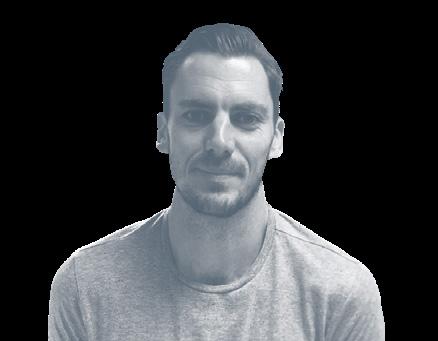
Sales Team: 01959 543 650 sales@sevenstarmedia.co.uk
Published by
SEVEN STAR MEDIA LTD
184 Main Road, Biggin Hill, Westerham, Kent Tel: 01959 543659 sevenstarmedia.co.uk

Disclaimer: Man Magazine is published bi-annually (twice per annum) by Seven Star Media Ltd. No part of Man Magazine may be reproduced, stored in a retrieval system or transmitted to any form without permission. Views expressed in the magazine are not necessarily those of Seven Star Media Ltd, and are included to provide advice only. No content is a substitute for professional medical advice. During printing, images may be subject to a 15% variation. © Copyright of content belongs to individual contributors with the magazine copyright belonging to Seven Star Media Ltd. All rights reserved. Please either keep this magazine for future reference, pass it on for somebody else to read, or recycle it.
First, we cherry-pick the world’s best writers in the fields of sport, style, cars, music, comedy, health & fitness, travel, adventure, and more.
Then we let them write the stories they want to tell. The stories that matter.
And finally, we give it all away for free. Because when it’s this good, every man deserves to read it.
The result is the world’s greatest magazine for men who want the best of everything.
This is the important bit. We know that being a man can be tough sometimes. Looking after your mental health, and helping your friends and family do the same, has never been more important. That’s why we work with Mind and CALM, two of the UK’s leading mental health charities. We want to help end the stigma around mental health and ensure that every man gets the support he needs.





The world’s biggest ever study on light exposure reveals we’ve got it all wrong – and it’s hammering our mental health.
The largest ever study on light exposure and its impact on mental health has found that people who spend more time in daylight have a decreased risk of disorders such as depression, anxiety, bipolar, and PTSD.
Increased exposure to light during the night, on the other hand, had the opposite effect.
“Once people understand that their light exposure patterns have a powerful influence on their mental health, they can take some simple steps to optimise their wellbeing,” says Sean Cain, Associate Professor at Monash University, who led the study. “It’s about getting bright
light in the day and darkness at night.”
More than 86,000 participants were involved in the study, and Cain says the impact of night light exposure was independent of demographic, physical activity, season, and employment status.
Cain explains that human brains evolved to work best with bright light during the day and then with almost no light at night. “Humans today challenge this biology, spending around 90 per cent of the day indoors under electric lighting which is too dim during the day and too bright at night compared to natural light and dark cycles,” he says. “It is confusing our bodies and making us unwell.”



“ I’ve always trusted Wellman - my wellbeing is a top priority.”



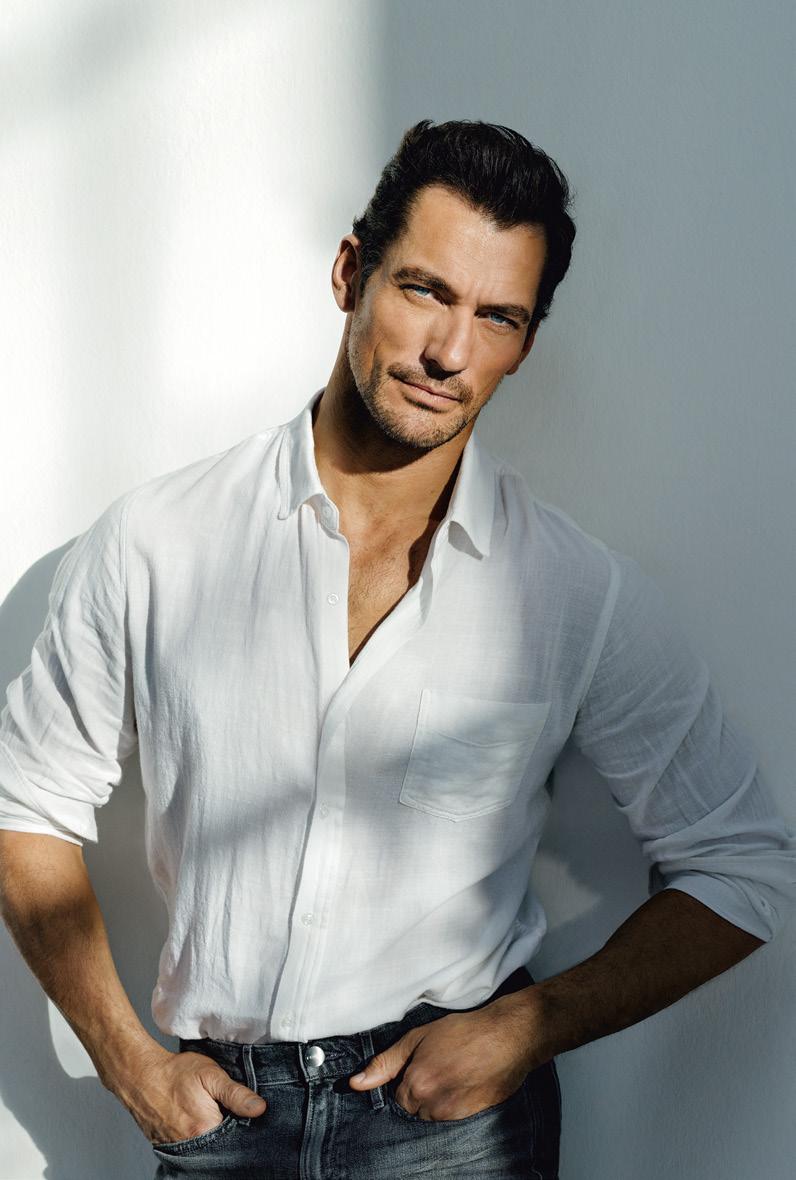







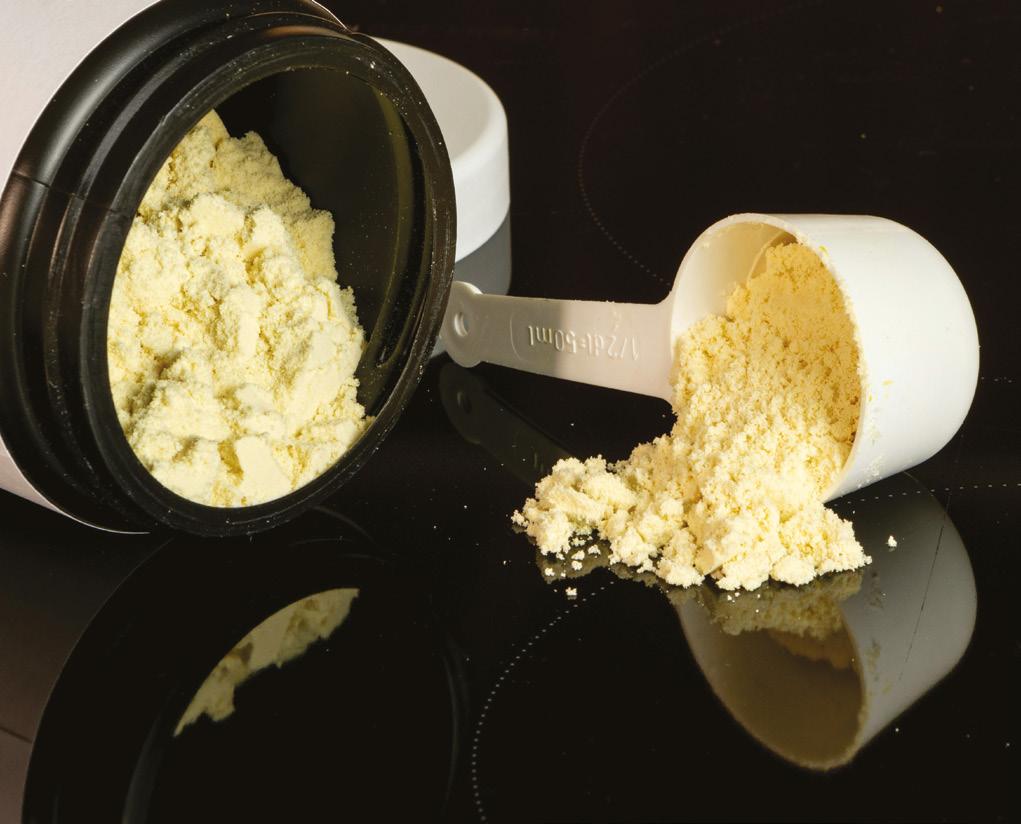
ost gymgoers know that protein is important for muscle growth, but just how much we should consume has always been a topic of some debate.
A meta-analysis of 49 studies may have ended that debate once and for all, and the answer might be less than you think.
The research, published in the British Journal of Sports Medicine, found that you need 1.6g of protein per kg of bodyweight across the day in order to maximise muscle growth (0.7g of protein per lb of bodyweight).
Protein intakes higher than that were found to offer “no further benefit”.
Consuming a bit more protein than the amount recommended above is unlikely to do any harm, but don’t go overboard. Excessive protein consumption can lead to dehydration, increase your risk of kidney stones, give you bad breath, and cause digestive problems, while diets high in meat can increase your risk of heart disease and cancer.
If you’re not doing resistance training or looking to maximise muscle growth, the standard RDA for protein is 0.75g per kg of bodyweight.

New research shows that when you sleep matters more than for how long.
etting the recommended eight hours’ sleep is all well and good, but new research shows that when you sleep is actually more important than how long you sleep for.
Researchers from Harvard University in Massachusetts and Monash University in Melbourne followed the sleep habits of 60,000 people to explore the link between premature mortality and sleep patterns.
They found that people with the most consistent sleep patterns – meaning the time they went to bed and the time they woke up – had up to a 40% lower risk of death by any cause, including cancer and cardiometabolic conditions.
“Sleep regularity is a stronger predictor of mortality risk than sleep duration,” they concluded.
The researchers still maintain that it’s important to sleep enough, with 7-9 hours the ideal window. Too much or too little sleep can have serious negative impacts on health and longevity.
Top tips from SleepFoundation.org
Cause for alarm
Establish a consistent routine by turning off the lights and setting the alarm clock at the same time every day. Yes, that means weekends too.
Light it up
Get natural light in your eyes as soon as possible after waking. This promotes better synchronisation of your internal body clock and circadian rhythms.
Don’t look at the lights
Keeping bright lights on late into the evening can prevent your body from properly transitioning toward sleep.

Ditch the screens
Smartphones and other devices are sources of excess mental stimulation and emit blue light that can affect circadian timing. Avoid using your phone, tablet, or laptop for at least an hour before bed.
Let’s get physical
Try to follow the same steps each night before going to bed, such as dimming the lights, quietly reading or stretching, putting on pajamas, and brushing your teeth. Over time, those actions become cues that tell your body that it is time for sleep.
While naps can be restorative in some cases, they can also disrupt your sleep routine. As a general rule, try to keep naps under 30 minutes and only early in the afternoon to prevent night-time sleep disruptions.
Both alcohol and caffeine can be detrimental to a healthy sleep routine. Alcohol makes you sleepy but affects your sleep cycle, making you prone to awakenings and lower-quality sleep as the night goes on. Caffeine makes you wired and alert and can linger in your system, leading to restlessness at bedtime.
A dark and quiet bedroom is best for promoting restful sleep. A cool yet comfortable temperature and soothing smells, like lavender, may promote relaxation and provide cues for sleep. 1 2 3 4 5 6 7 8 9
Regular exercise promotes healthy sleep. Just make sure any high-intensity activity is finished a couple of hours before bed (get your mind out the gutter).
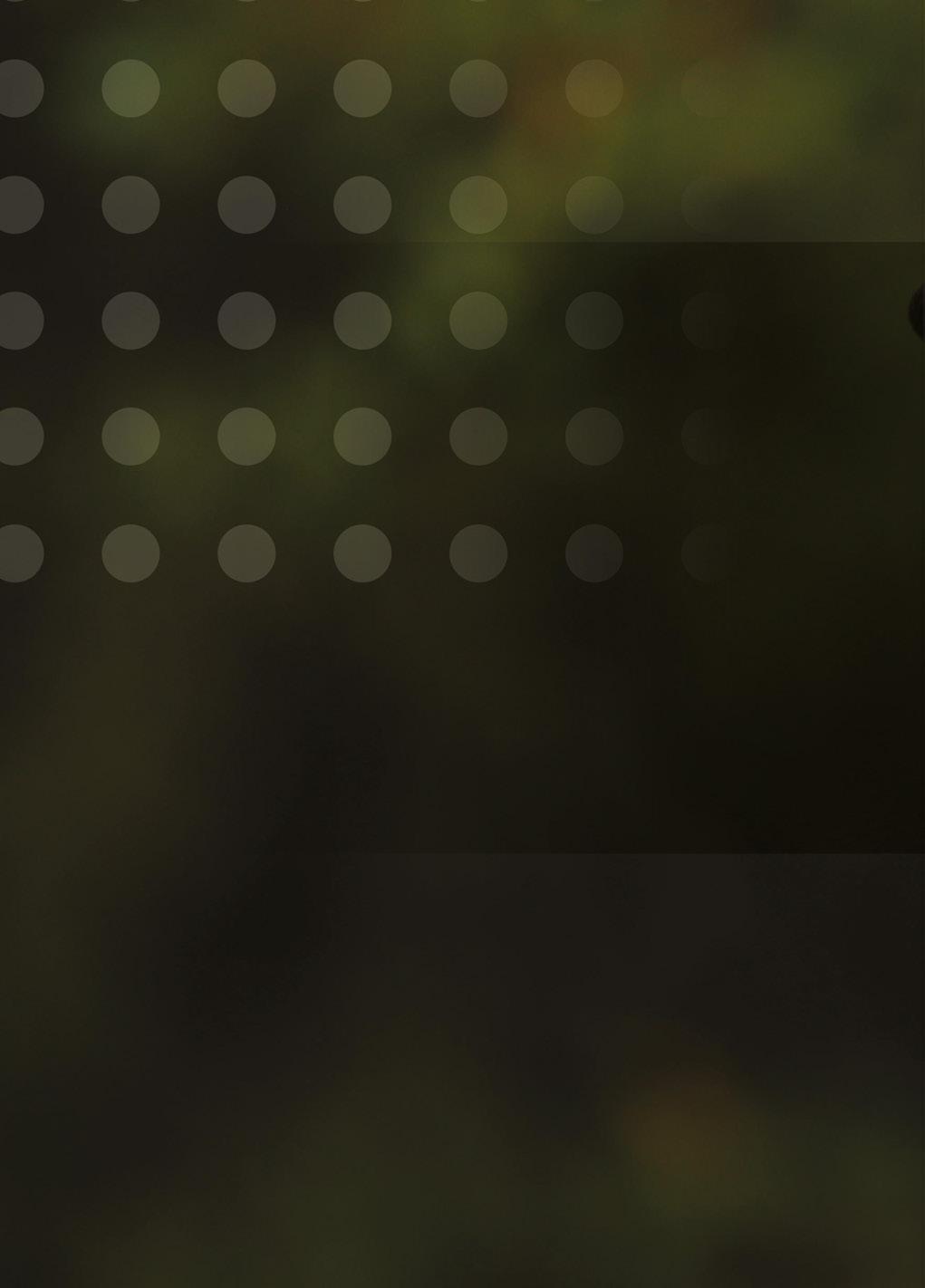
DP World Tour star Andrew ‘Beef’ Johnston reflects on the suicide of fellow tour pro Grayson Murray and shares his hope that some good can come out of the tragedy.



Perspective. It’s something golf has desperately needed over the last couple of years.
It’s heartbreaking that it’s taken the death of one of our own to truly highlight that.
Grayson Murray’s passing is a tragedy. Not because he was a golfer, but because he was a human being. A young man who was trying to fight his demons. The fact taking his own life felt like the solution to those struggles for a 30-year-old with so much to live for is truly awful.
Grayson had spoken openly about his battle with alcohol and depression, but he appeared to have taken huge steps and talked positively about his progress.
He was playing good golf, won on the PGA Tour this year and, from the outside looking in, things seemed encouraging. But that’s the key. The outside looking in. None of us truly know what was going on in his head. Why he chose to walk off the course after 16 holes and made that final decision. Golf is such a singular sport. It’s not like football or rugby where there are big squads and everyone’s keeping an eye on everyone. We’re out on the road spending a lot of time away from families and friends, often alone in strange cities or hotel rooms, with lots of time to think.
It’s very easy to forget, especially in the modern game where there’s so much focus on money, that golfers are still normal people. We laugh, we cry, we have self-doubt.
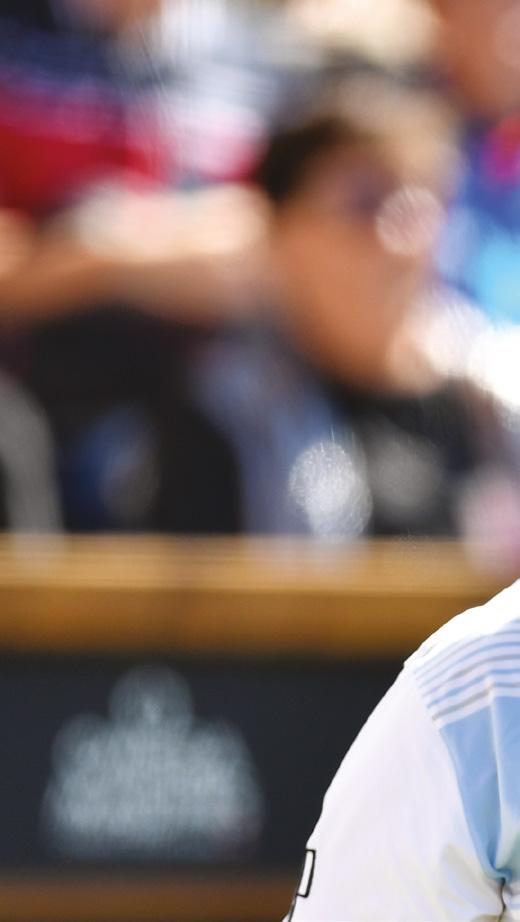
\\ I STOOD ON THE 19TH FLOOR OF A BUILDING IN SINGAPORE
AND STARTED TO WONDER WHAT WOULD HAPPEN IF I JUST JUMPED OFF? //

We aren’t immune from all of life’s stresses just because we’ve got a job that other people dream about. Naturally sport brings with it amazing highs and some serious lows, but golf by design will leave all but one of us failing to achieve our goal every week. Only one man can win and, coupled with the lifestyle on Tour,
Grayson had previously suggested he didn’t get the support he needed from the PGA Tour. The fact he’s no longer with us means questions will be asked if more could have been done. What the Tour must do now is ensure this never happens again and that those impacted are well
It doesn’t matter who we are, there will be times in life when we’ve

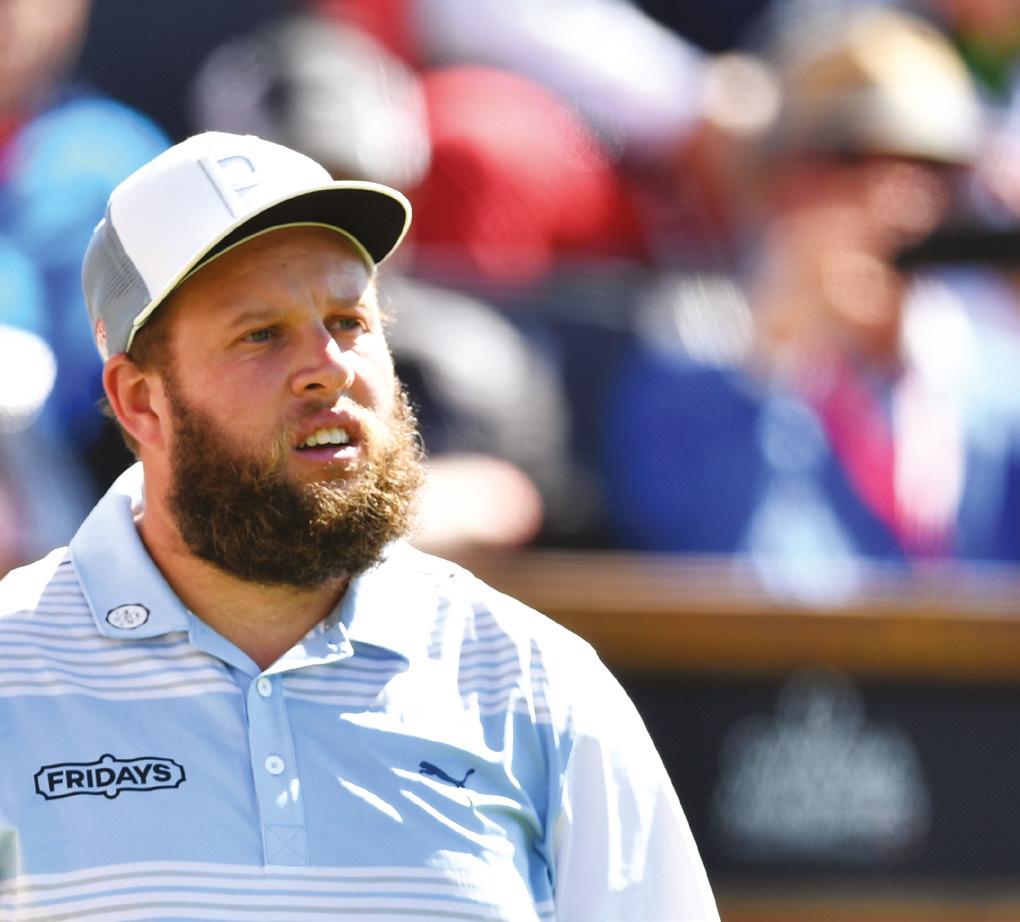


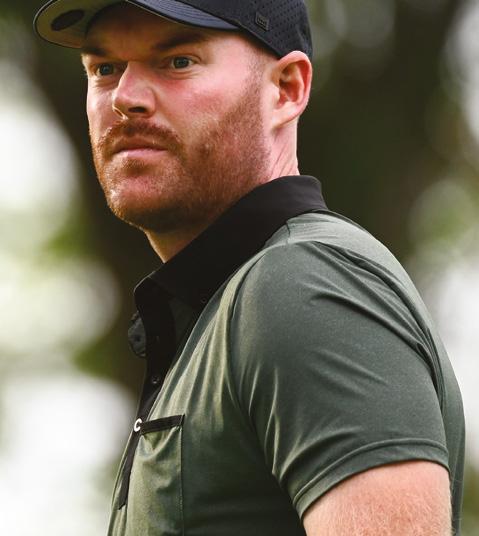
struggled, but I guarantee we haven’t all immediately spoken out or sought help. Sometimes we might not even realise that we’re sinking – it creeps in over time and we just assume tomorrow will be better. Sometimes we are aware, but it’s easier to put a face on in public. Talking about our battles and mental health has become more commonplace, more encouraged, and that is positive, but that still doesn’t mean everyone will be ready to do it. What’s so tragic is that Grayson had been open about the challenges he’d faced but for some reason, on this occasion, he felt he couldn’t.
\\ IT DOESN’T MATTER WHO WE ARE, THERE WILL BE TIMES IN LIFE WHEN WE’VE STRUGGLED //
The doctor on the DP World Tour told me that mental health issues are the second most common thing he deals with among the players. What’s good is that people are talking to him and that the Tours have things in place to help, but even then, it still requires the person who is struggling to put themselves in front of him. I was talking to my coach Jamie Gough, who also looks after Matthieu Pavon, and Matthieu has been practising at the same course as Grayson for the past few months. He coaches Ryan Fox, too, and they’d played together. He said there were no signs that this could happen – you’d never have seen it. That’s the challenge with depression. Unlike a big injury, you can’t walk down the range and instantly spot a player whose mental health needs treatment.
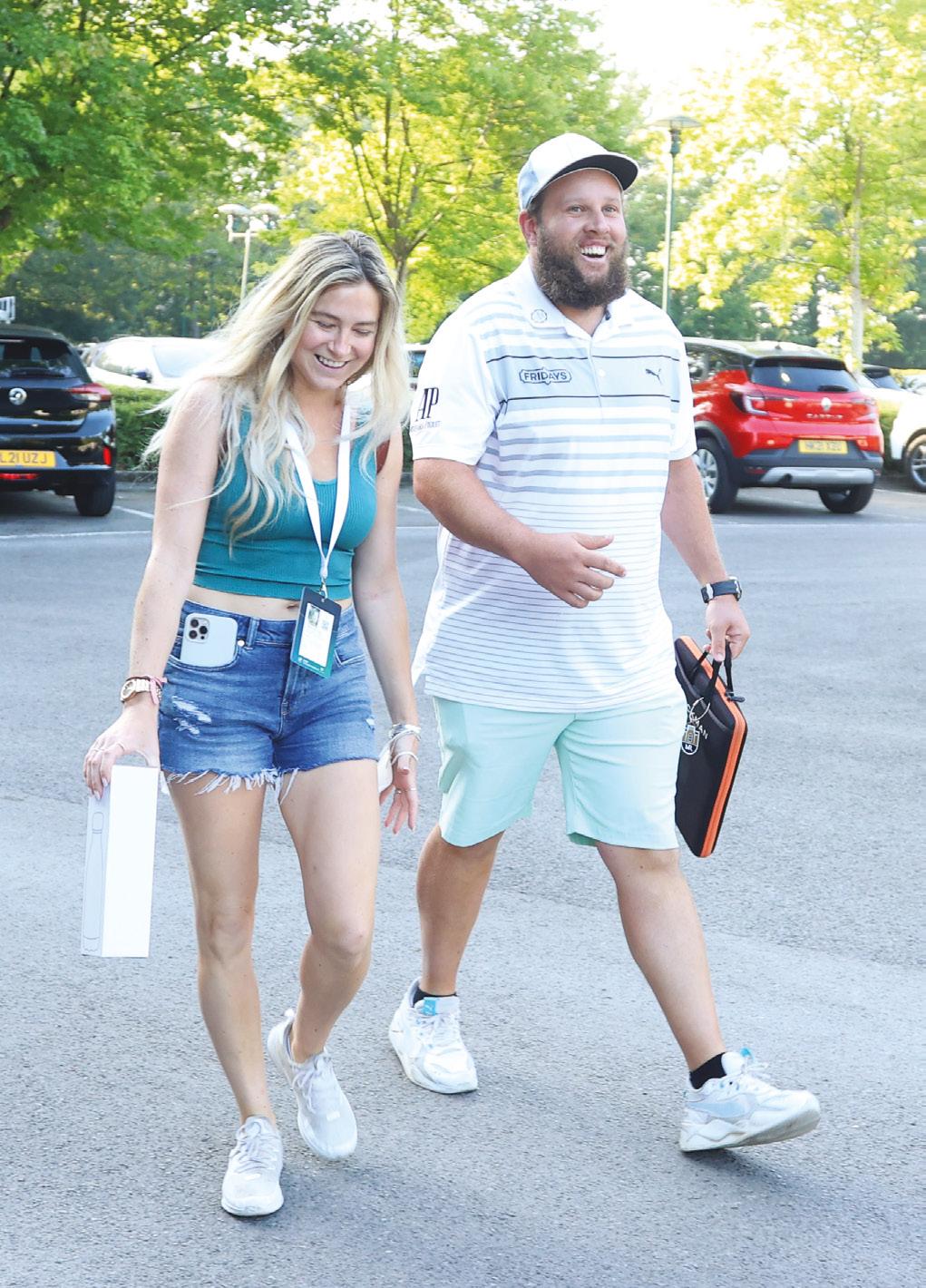
\\ I WANT TO BE REMEMBERED FOR BEING A LOVING HUSBAND AND FATHER, AND A NICE GUY,
NOT
BY HOW MANY TOURNAMENTS I PLAYED, CUTS I MADE, OR TROPHIES I WON //
If someone says they’re doing good then, for the most part, you have to take them at their word and just keep checking in on them if you’re concerned.
I’ve spoken openly about my own struggles in the past. When I started to become successful, especially when I went to the States, I was pulled from pillar to post, almost led astray. I wasn’t managing my own time, I struggled to say no, my game suffered, I started hanging on to negative thoughts and I ended up exhausted. I hit a point where I just wanted to be in a dark room for a week.
I’ve spent a lot of the last two years injured, questioning if my career is over, slipping back into a dark place. I stood on the 19th floor of a building in Singapore and started to wonder what would happen if I just jumped off?
But I’m so thankful that I have good people around me who have helped me. If it hadn’t been for my wife Jodie, I don’t know where I’d be. Thanks to her I spent some time with Steve Peters (psychologist) and he effectively helped me rewire my brain and process things in a different way.
Now I’m back on Tour and I’m treating things very differently. Golf always felt like the most important thing in the world. “I need to make the cut. I need to keep my card. I want to win that tournament. I need to play the Ryder Cup.” All of those things are still true, and I’m going to try my best, but they’re way down the list of what matters the most. Now, if I miss a cut, I’ll go and get ice cream with Harley, my daughter, because she doesn’t care if I’m playing the weekend or shot 90 and missed the cut!
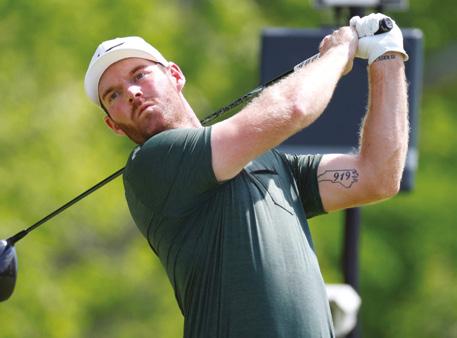

When I look back in old age, I want to be remembered for being a loving husband and father, and a nice guy, not by how many tournaments I played, cuts I made, or trophies I won.
There were times when I was injured in Africa after making my comeback and some negative thoughts would creep in. But then I drove past the township and was like “what the fuck are you moaning about here?” I’m feeling sorry for myself and there’s people living in poverty. And I know it’s always easy to find people who are worse off than you, but sometimes you need that reality check.

A tragedy like this sends shockwaves and causes a feeling of hurt whether you knew Grayson personally or not. We’re human and we all find ourselves imagining how those closest to him are feeling. Regardless of everything that’s gone on in golf over the last couple of years, as pros we all have huge respect for one another. Everyone’s working hard, trying to get the most out of their career, stay healthy and provide for their families.
It shouldn’t take a loss of life for us to step back and look at the bigger picture, but we need to remember this newfound perspective. If Grayson’s death can remind us all to think about others and check in on friends and colleagues, then at least his family may find some consolation from something so devastating.
Read more from Andrew ‘Beef’ Johnston in his regular column at todays-golfer.com
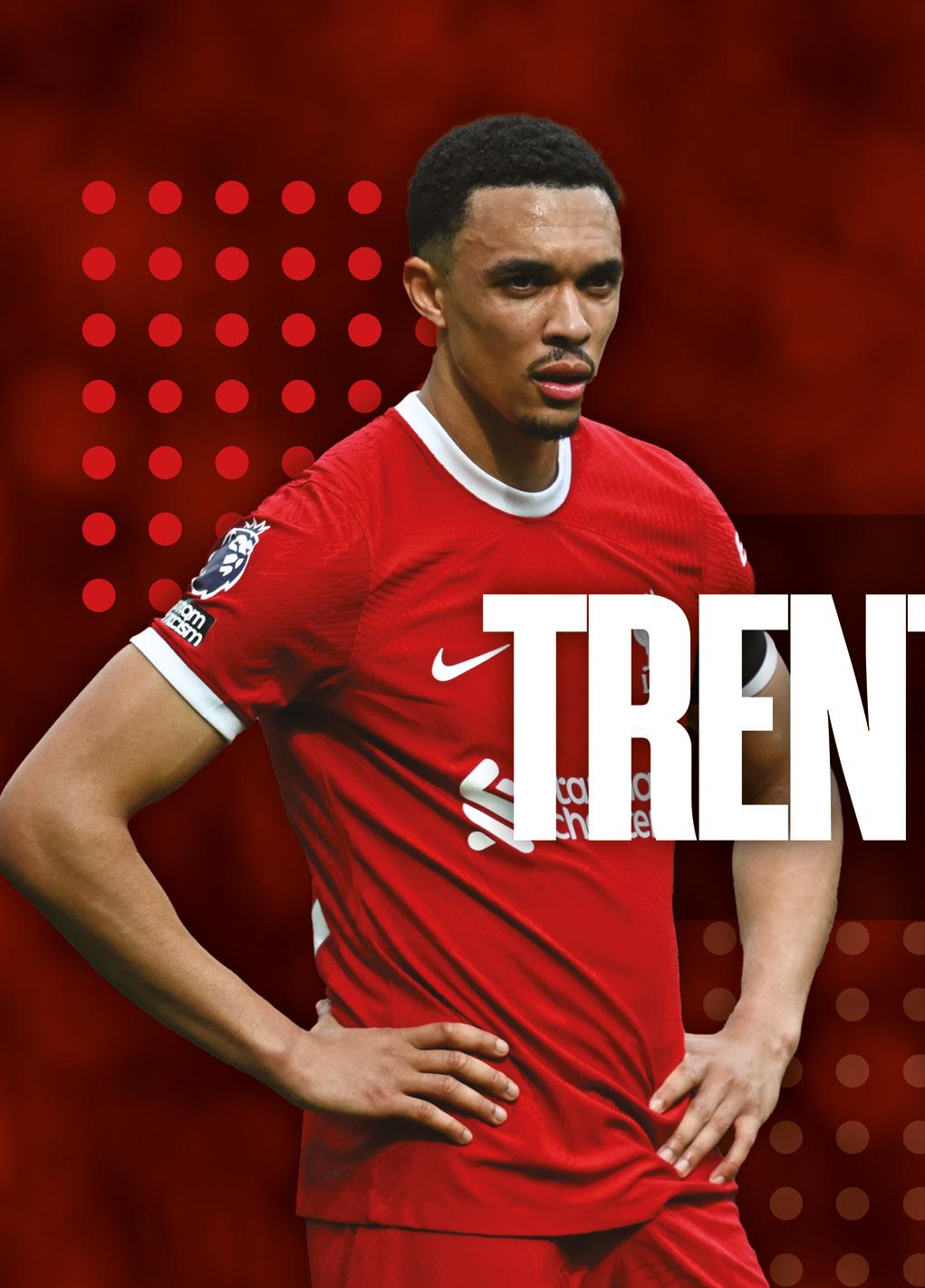
“WINNING BIG INDIVIDUAL HONOURS” “BEST PLAYER IN THE WORLD” “BEING A CAPTAIN” “WINNING TROPHIES FOR ENGLAND” “LEGENDARY STATUS IN FOOTBALL”

The Liverpool and England star has won the three biggest trophies in English football, lifted the Champions League, and previously been named PFA Young Player of the Year and Premier League Young Player of the Season. But he’s just getting started…
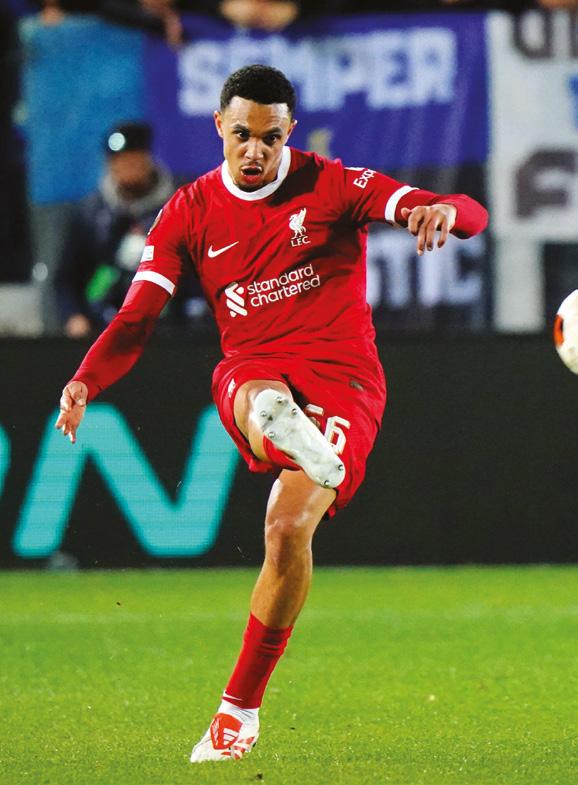
It’s a question every 19-yearold dreads. ‘Where do you see yourself in a few years’ time?’ Asked that question in 2018, having broken into Liverpool’s first team but yet to win an England cap, Trent Alexander-Arnold’s answer was as accurate as one of his now famous dead-ball deliveries: “Still at Liverpool – an important figure in a team that’s won a lot of silverware.”
If the first phase of his career as a Liverpool regular has been important, the second is crucial. You get the feeling he knows it. Now 25 and the Reds’ vice-captain, repeating the question ‘Where do you see yourself in a few years’ time?’ has sent Alexander-Arnold into deep, silent thought. He wants his reply to be as measured as one of his signature passes. He won’t be rushed. He’s stewing, searching for a big answer to a big question.
“Wow. Where will I be? Where will

\\ I STILL BELIEVE I HAVE A BIG ROLE TO PLAY WITH ENGLAND,
I be?” he quietly repeats to himself, before exhaling through pursed lips.
We wait, as eager to hear his answer as we are to watch the next chapter of what has been a wondrous career.
In 2018, that 19-year-old had big potential and big dreams. In 2024, he has both Premier League and Champions League winner’s medals to his name, plus a ticket on England’s plane to Euro 2024 in Germany all but booked.
“Everything’s just kind of evolved,” he says, reflecting on the passage of time since his breakthrough campaign, cogitating on whether or not there was a specific moment where he felt like he officially
belonged in the Liverpool first team.
“There have been significant moments that changed my mentality. After Kyiv [where the Reds lost the 2018 Champions League Final to Real Madrid], I went from being a young player who’d played in a Champions League final at 19, to needing to experience it again and wanting to be back there. Simply feeling, ‘This is where I belong’.
“It was always a dream to reach that level, and to do it so young, it wasn’t like, ‘OK, I’ve achieved that now’. It was more like, ‘I need to play in as many finals as possible’ because those were the feelings I chased so much. That really motivated me, so I think Kyiv was a big moment.”
That late May night in Ukraine’s national stadium, Alexander-Arnold experienced the thrill of playing on the biggest stage in club football but also the devastation of having his teenage dreams crushed by the holders, featuring some robust defending from Sergio Ramos and acrobatic Gareth Bale brilliance.
Twelve months on, he helped to right that wrong in an extraordinary semi-final second leg at Anfield, as Liverpool overcame a 3-0 first-leg deficit to beat a Lionel Messi-inspired Barcelona 4-3 on aggregate.
It was a script that even the scattiest of screenwriters would be nervous submitting. The key scene saw Alexander-Arnold take possibly one of the most famous corner-kicks of all time – rather than wait for Virgil van Dijk to march up from defence, the rookie right-back instead caught the entire Barça team napping with a swiftly-taken set piece that allowed Divock Origi to bag the winning goal.
“It was just natural,” he says, shrugging off the significance of his quickly-whipped corner. “I felt like the big occasions might alter the way I thought, or affect me in a different way. Whereas when I got to those big occasions, I felt like that’s where I belonged.
“That’s what brought the best out of me – rather than downing tools a little bit and not being able to perform to the level, it was more I had to elevate myself to a high level. Those sorts of games naturally demand you to play the best that you can and think on the spot, and have those moments of brilliance – I was able to come up with one.”
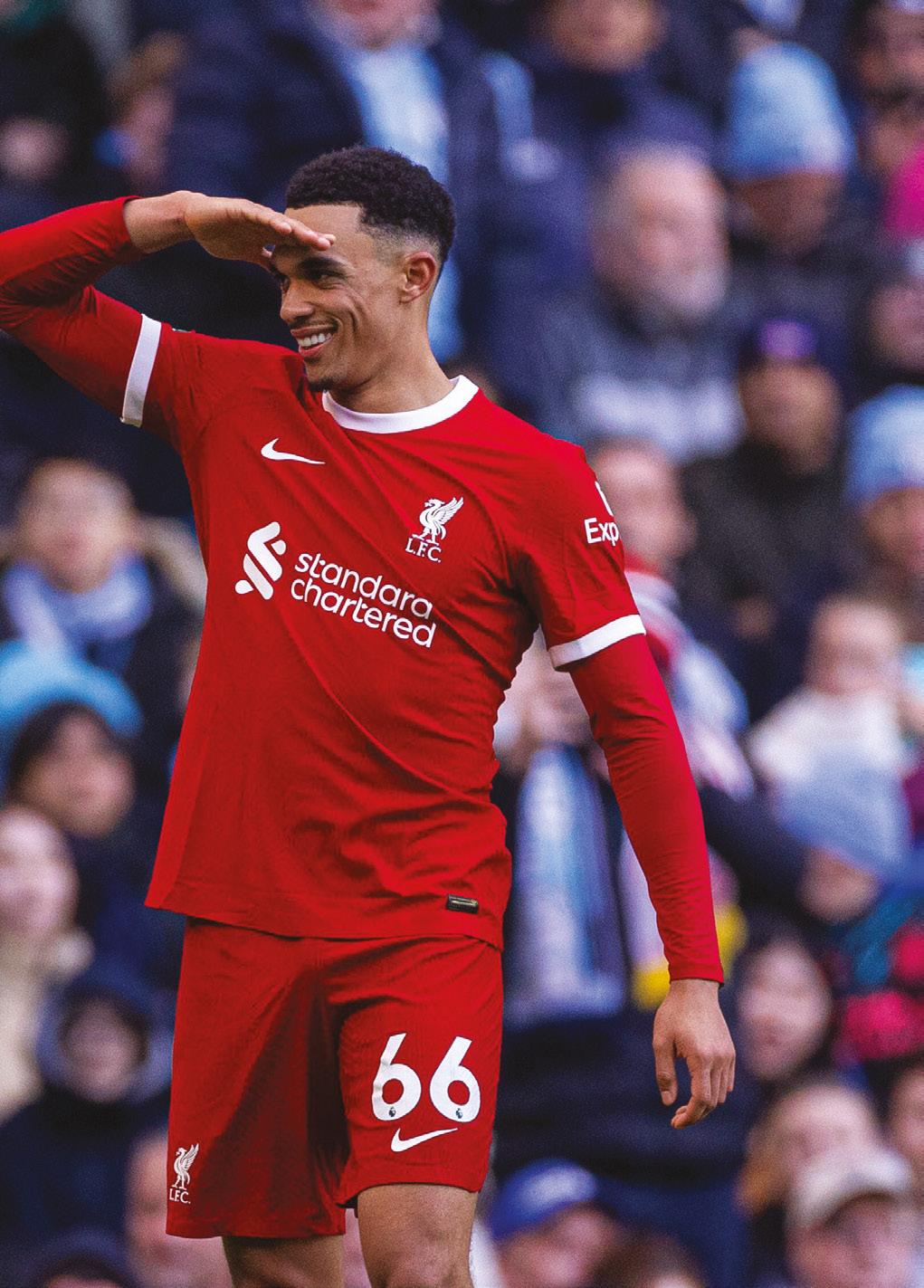
\\ CITY CAN SWITCH IT ON AND IT’S A HARD MACHINE TO STOP, BUT THERE’S NO REASON WE CAN’T MATCH THEM //
The context of the moment – 11 minutes of normal time remaining, 3-3 on aggregate, all-star opponents – made the audacity of what the 20-year-old did in front of the Kop almost laughable. Even goalscorer Origi had his back to play as Alexander-Arnold pulled the trigger on his cross. What prompted the tyro to even attempt such a high-risk move?
“I just thought, ‘It’s there’,” he reflects. “I’m someone who doesn’t fear mistakes. It’s not something that will change the way I play the game. If I believe there’s a chance to create an opportunity or do something to help the team win a game, then I don’t second guess my judgement on it.
“In that split second, you weigh up all of the options. Do you wait for your centre-backs to come up, whip the ball into the penalty area and hopefully put it on Virg’s head? Or do you trust your gut and not think, ‘If I cross it now and Divock doesn’t turn, Barça will clear it, or it might go straight through the box and I’ll get shouted at’. Those sorts of things never really change the way I make my decisions.”
Football IQ and bravery combined to create an incredible moment, and a route from 3-0 down in Barcelona – Joe Gomez had started the first-leg loss at the Camp Nou rather than Trent – to Atletico’s Madrid’s Metropolitano Stadium and a 2-0 Champions League final triumph against Tottenham. It was Liverpool’s sixth European Cup success, lifting their tally above Barça’s once more.


That night in Spain’s capital went some way to healing the domestic pain suffered three weeks earlier, when Jurgen Klopp’s men took the Premier League title race to the final day of the season. They won their last nine games to finish on 97 points, then the highest total in their history, only for Manchester City to pip them on 98 after a 14-match winning streak.
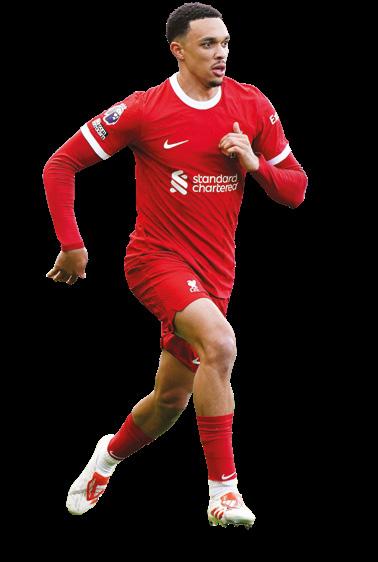
“It needs to be demanded to reach those numbers – you can’t get to them with luck. It’s hard to do it if every other team achieves low-80 points, but when you know one team is capable of reaching 100, you need to get in and around 100 to even stand a chance. It’s been about demanding the maximum from each other – us and City have been able to do that consistently.”
The momentum generated after defeating Tottenham in Madrid catapulted Liverpool into the 2019-20 campaign, navigating the COVID pandemic to finally secure their first league title in 30 years. It was clinched in statistical style: earliest title win ever (with seven games remaining, even though it was actually in June), biggest points lead at any stage of the season (25), and most consecutive home victories (24, of which seven were carried over from 2018-19). Their record points haul of 97 had lasted just one season – they topped the table with 99.

A year earlier, Pep Guardiola’s team topped the table with a record 100 points. Using the modern day tennis theory of Roger Federer, Rafael Nadal and Novak Djokovic driving each other to heights no one thought ever existed, and applying it to the current Premier League era, have Klopp and Guardiola found levels in their sides that they might not have thought possible without each other?
“Oh, by far. By far!” he says. “It’s no coincidence that the best points tallies ever have all come in the last five or six years. Without us, I don’t know if Manchester City consistently post those numbers, and I’m sure that without City, we wouldn’t have hit those numbers consistently.
\\ IF IT WASN’T FOR COVID, WE’D HAVE BROKEN EVERY RECORD OUT THERE //
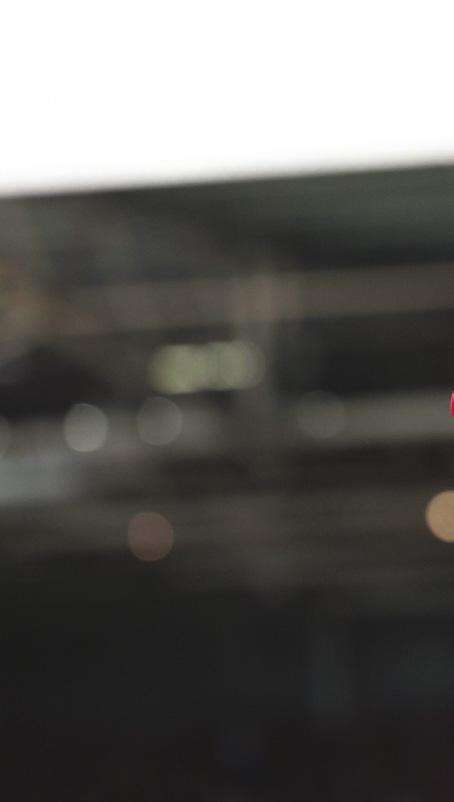
“If it wasn’t for COVID, we’d have broken every record out there, in terms of number of points won and goals scored, but it wasn’t meant to be,” reflects Alexander-Arnold, still pondering ways they could have improved on their best ever league campaign. Having won a ludicrous 27 of 29 games before football was halted, they drew twice and lost twice in their final nine matches.
“But the way we played, and how incredible we were that season was… I don’t think we’ll ever see anything like it again,” adds Trent. “How far we got without really dropping any points is something I’m sure not many teams will ever go on to achieve.”
The title was confirmed in slightly strange circumstances, with the Reds’ squad and staff gathered at Formby Hall, socially distanced from fans, watching Manchester City lose to Chelsea behind closed doors. The pandemic denied the team the celebrations they had shed blood, sweat and tears for.
“It was unfortunate,” recalls the rightback now. “But we made the best out of a different situation to what it could have been, and we did celebrate – that night
was unbelievable.”
Alexander-Arnold picked up the PFA Young Player of the Year prize that term. Four years on, his displays have put him in contention to receive the senior award at some stage and join an elite group of men to gobble up both honours: Andy Gray, Ian Rush, Mark Hughes, Steven Gerrard, Cristiano Ronaldo, Ryan Giggs, Wayne Rooney, Gareth Bale, and Eden Hazard.
“I think he’s stepped up,” said Reds legend Jamie Carragher, praising AlexanderArnold on the Stick to Football podcast. The former defender was pointing to the fact that Virgil van Dijk, Mohamed Salah, and Trent all have deals due to expire in the summer of 2025.
“Maybe with Jordan Henderson and James Milner not being there, you feel there’s a bit more of a presence about him now. Trent is the one you’ve got to build this team around for a new manager coming in – he’s the most important one.
“Salah and Van Dijk? In six months, the club will look at that and go, ‘You have six months left, how are you feeling?’ They’re both on big wages and rightly so, but a year is a long time in football. In
12 months, Salah and Van Dijk will be 33 and 34, so while there’s all of this panic about losing them, it might be the right decision.”
The three giant elephants in the room can’t be ignored, even if the more pressing priorities have been challenging for a second Premier League title and preparing to say goodbye to their beloved boss after almost a decade at the helm. But while there’s been a lot of noise about Liverpool’s star trio, Alexander-Arnold has remained focused on the task at hand.
That means not worrying about individual accolades, too. Deep down he would love to bag the PFA Players’ Player of the Year prize in the near future – on the surface, though, he’s relaxed about the fact his name was mentioned among the potential contenders earlier this campaign.
“You hear things, but no, it’s not something I actively think about,” he says. “If your team does very well and you perform, then you’ll be honoured at the end of the season. You need to be able to help the team get wins, because it would
be quite rare that you find someone whose team finishes sixth or seventh winning a big individual award. It’s always from the teams that come first or second. I want to be the best player I can be, and I’ve always been a firm believer that individual awards follow team awards.”
Liverpool have finished outside the topfour only once in the last eight seasons, but haven’t been able to stop City’s sky blue juggernaut making history by winning the league four years in a row.
“It’s difficult,” admits AlexanderArnold. “You’re up against a machine that’s built to win – that’s the simplest way to describe City and their organisation. Looking back on this era, although they’ve won more titles than us and have probably been more successful, our trophies will mean more to us and our fanbase because of the situations at both clubs, financially. How both clubs have built their teams and the manner in which we’ve done it probably means more to our fans.
“From the turn of the year, City switch it on and it’s a difficult machine to stop. But we’ve shown in the past that we’ve been able to do it and there’s no reason why we can’t go and match them.”
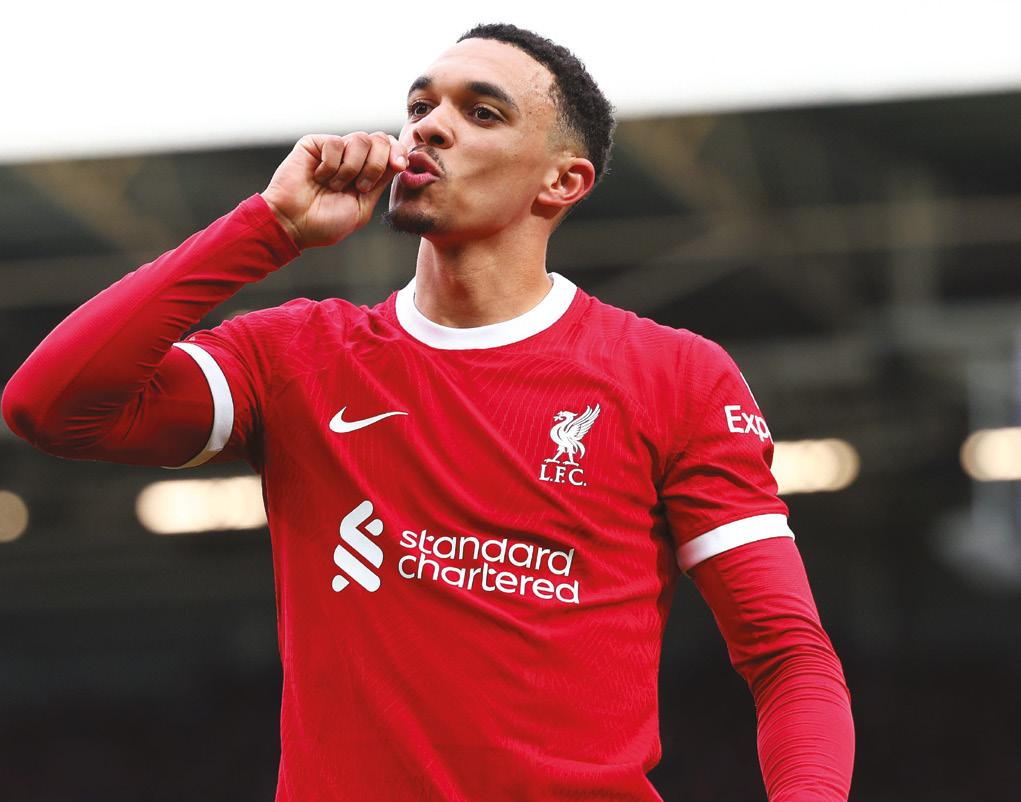
Alexander-Arnold in 2024 still looks exactly like the teenager that first broke into the Liverpool team: fresh-faced, trim, his eyes scanning as intently for the correct answers to our questions as they would for a killer through-ball to Salah. But there’s a marked change in demeanour between the teenage Trent we met in 2018 and the 25-year-old Trent of 2024. There’s a calmness and seriousness. The boy is now a man, equipped with the quiet confidence that persuaded Klopp to award the lifelong Red the vice-captaincy following the exits of Henderson and Milner.
With Van Dijk acquiring the armband from Henderson, the moment AlexanderArnold discovered that he was to become second in command was touchingly captured by the Reds’ media team, as Klopp pulled him aside in the middle of a pre-season training session while on tour in Singapore.
“I don’t know why he chose that moment,” reminisces Trent. “I think it was more that he maybe felt like it was going to get out into the press. I think he just wanted to let me and Virgil know, then later on that evening he told the whole leadership team. It was a very, very special moment for me.”
The element of surprise has been a Klopp signature – in February, AlexanderArnold informed the media that he knew nothing of the manager’s decision to leave at the end of the season until the day it was announced. “I was as shocked as anyone else – it was a huge surprise to all of us,” he said. “But it’s a personal decision that he’s taken and you have to respect it. I’ve loved absolutely every minute of working with him.
“He’s changed my life and the lives
emotional Alexander-Arnold after a home win against Wolves marked Klopp’s final game in charge. “This was all possible through him. I can never say thank you enough for that. He made my dreams come true. I haven’t cried in years, so it just shows how much he means to me and the club,” he added.
The vice-captaincy is a wonderful leaving gift, from the only club boss that Trent has ever played under. “It’s something I worked incredibly hard for,” he says. “Something I set my sights on for a while, and something I’ve not been shy in speaking about: being a leader and being a captain; leading in my way, which is being fearless, always getting on the ball and always trying to make things happen. The competitiveness that I bring to the team, a will to win in training and games, hopefully drags other guys through with me.”
Given Van Dijk’s age, Alexander-Arnold appears likely to succeed him as skipper in the not-too-distant future. He smiles when asked if he’s already begun rehearsing his version of the ‘Hendo shuffle’, the former captain’s distinctive trophy-lifting technique, when it’s his own turn to raise

“No, I haven’t
thought about it,” he insists. “But I’m sure if that day does come, I’ll need to think of something creative that fits right with me! That’s something I dreamed of as a kid –lifting trophies, being the leader.
“But it’s much more than just being able to lift a trophy at the end of a season. It’s about helping the team get there and things behind the scenes that you have to do as a leader, helping the team to bond and really sacrifice for each other. There’s a lot that goes into it. The icing on the cake is lifting trophies at the end. Potentially one day that’ll be something that is a reality for me.”
Lifting more trophies, and the prospect of doing it as Liverpool’s homegrown captain, is fairytale stuff. On the international stage, the fable hasn’t been so utopian. For a player as talented as Alexander-Arnold, his current tally of 23 caps feels on the lean side. Fellow 25-year-olds Declan Rice and Mason Mount have 50 and 36 respectively, even if the latter has been going through a difficult period at club level in recent times.
Alexander-Arnold is philosophical about his own situation – there have been extenuating circumstances to factor in such as injury, club versus country tactical differences, and the avalanche of talent that England have at right-back, where he’s been competing with Kyle Walker, Kieran Trippier, and Reece James.
“I think a lot of it comes down to timing,” says Alexander-Arnold, after a lengthy pause. “In a different era and
\\ I DON’T FEAR MISTAKES. IF THERE’S A CHANCE TO DO SOMETHING AND HELP US WIN, I DON’T SECOND GUESS MY JUDGMENT ON IT

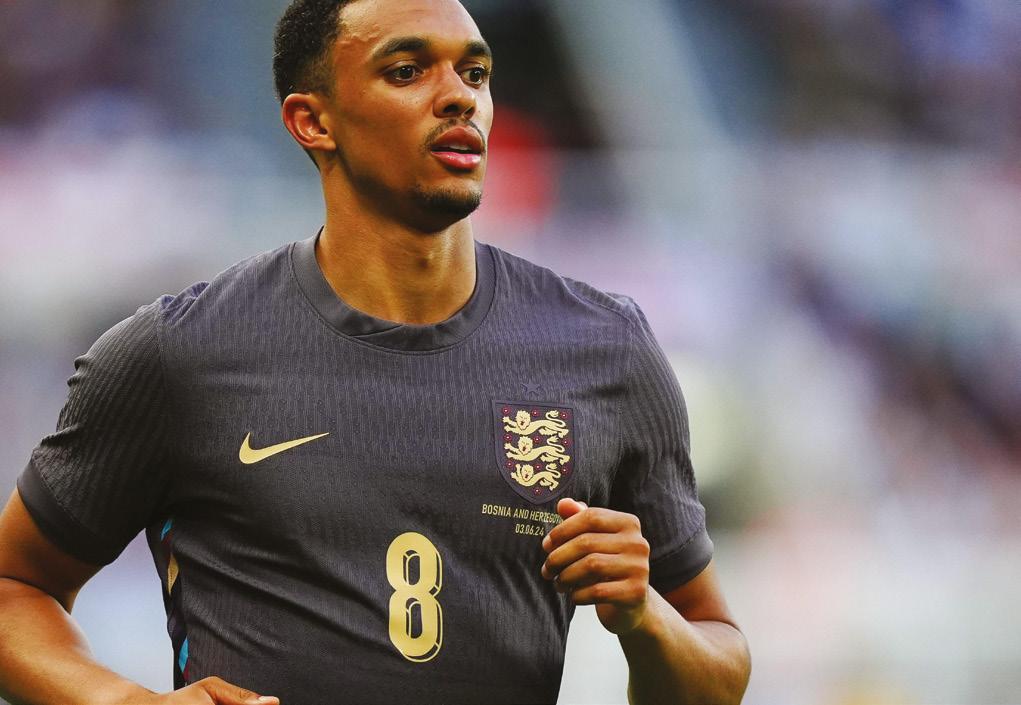
different generation, I’d have played much more for my country. However, I’m a firm believer in my own ability, what I bring to a team and what I can do on a football pitch. I still believe I’ve got a big role to play with England, to go and help the team win silverware – whether I play every minute of a tournament or I play no minutes at all in a tournament.
“I fully understand that decisions have to be made and I’ll never throw my toys out the pram. I feel like I’ve enjoyed the good side of it at club level, as someone who knows he’s going to play most games, and I’ve got that trust in the manager. I’m fortunate enough to not have to think about that too much at Liverpool, and just go and perform.”
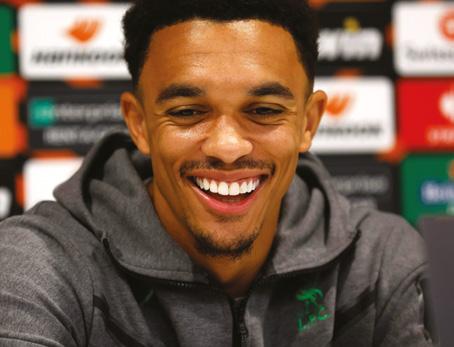
Alexander-Arnold has travelled to a couple of major tournaments with the Three Lions: the World Cups of both 2018 and 2022 – he was named in the squad for Euro 2020, but pulled out after injuring a thigh in a warm-up game against Austria.
Even at the two World Cups, he only played a total of 112 minutes, appearing in the third and final group match of both competitions.
Against Belgium in 2018, he started when the Three Lions had already qualified for the next round; against Wales in Qatar, he jogged on when England were 2-0 in front. On a handful of occasions, he’s found himself omitted from the squad entirely.
Gaffer Gareth Southgate has always been regarded as someone who treats players with care and respect, and Alexander-Arnold’s experience with him seems to reinforce that.
“No matter what, no matter how the news is presented to you, it’s always disappointing when you’re told you’re not in the squad or you’re not in the team,” he admits. “But I’m someone who’s very rational around those kinds of things.
“I know how difficult it must be. You’ve got so many options, so many decisions to make, and I’ll never hold it against a manager for making that decision. Every player thinks they should start. It’s natural. You think, ‘I can win games and I can help the team’. You believe you’re good enough and you need that belief. So no matter what, no matter who you pick, you’re always making the wrong decision – it’s a lose-lose situation.”
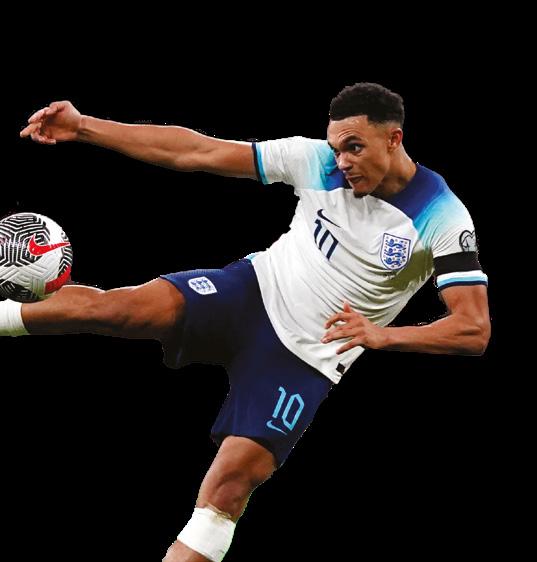

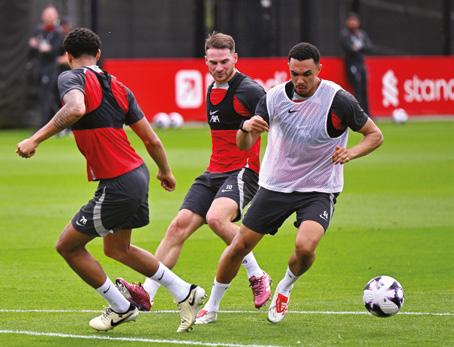
Clearly, playing for his country means an awful lot to Alexander-Arnold. “Oh, so much, so much,” he stresses. “When I was younger, I dreamt of being able to play for my country, to win trophies for my country, to be a part of England teams that win titles. I’ve still got those ambitions, and every time I’m able to wear the shirt, words don’t really describe it.”
The chance to fulfil those ambitions lies in wait in Germany, with Alexander-Arnold’s evolution into a hybrid defender-midfielder adding a tantalising option to the Three Lions’ arsenal heading into Euro 2024. Southgate picked him in midfield for England’s qualifiers against Malta and North Macedonia in June 2023, then repeated the trick for the reverse fixtures against the same sides in November.
And beyond that, where does Trent see himself in five years’ time?
“Ah, what do I even say?!” he smiles. “I’ll be 30 – now that’s scary.” After a long pause, he has his answer. “Winning big individual honours, being the best player in the world, being a captain, playing my part in winning trophies for England, cementing a legendary status within football.” Bold, ambitious, not illogical. Roll on 2029.
Turn over to read Trent on tactics.
Last year, the Reds’ ace launched The After Academy, helping those who didn’t make it professionally to secure work outside the game.
According to PFA statistics, 99 per cent of kids signed to an academy aged nine don’t reach the pro ranks.
Of starlets who sign a scholarship at 16, just 17 per cent are pros at 21. The After Academy now has a jobs board on the PFA website, listing roles open to ex-academy players. The hiring process doesn’t focus on traditional qualifications, instead prioritising those who can display transferable skills picked up while at academies, from leadership and teamwork to resilience.
On top of assistance from the PFA, Trent has enlisted help from his club and commercial partners, as well as injecting some personal cash into the project – he tells us why...
When did you come up with the idea for The After Academy?
At the back end of 2020. I saw a lot of people in unfortunate situations due to COVID, including pals I grew up with.
Helping them is something I’ve been passionate about for ages.
How will it help
By giving chances to young people who drop out of academy systems. The most important word is opportunity – that’s all you can ask for between 16 and 21. You need to be ready to take it, whether that’s football or not. So, we provide opportunities through work experience and internships at brands.
Is there a player you saw at academy level who you’re shocked never made it as a pro?
More than I can name, to be honest. You wouldn’t believe the amount of talent in the academies. There were many players I came up against and played with who I always thought were better than me – technically better and physically better – but key decisions didn’t go their way, injuries kicked in, or they just never kicked on, then found themselves out of football. The endless amount of players that happens to yearly is extraordinary, and that’s why creating something like The After Academy is incredibly important to me.

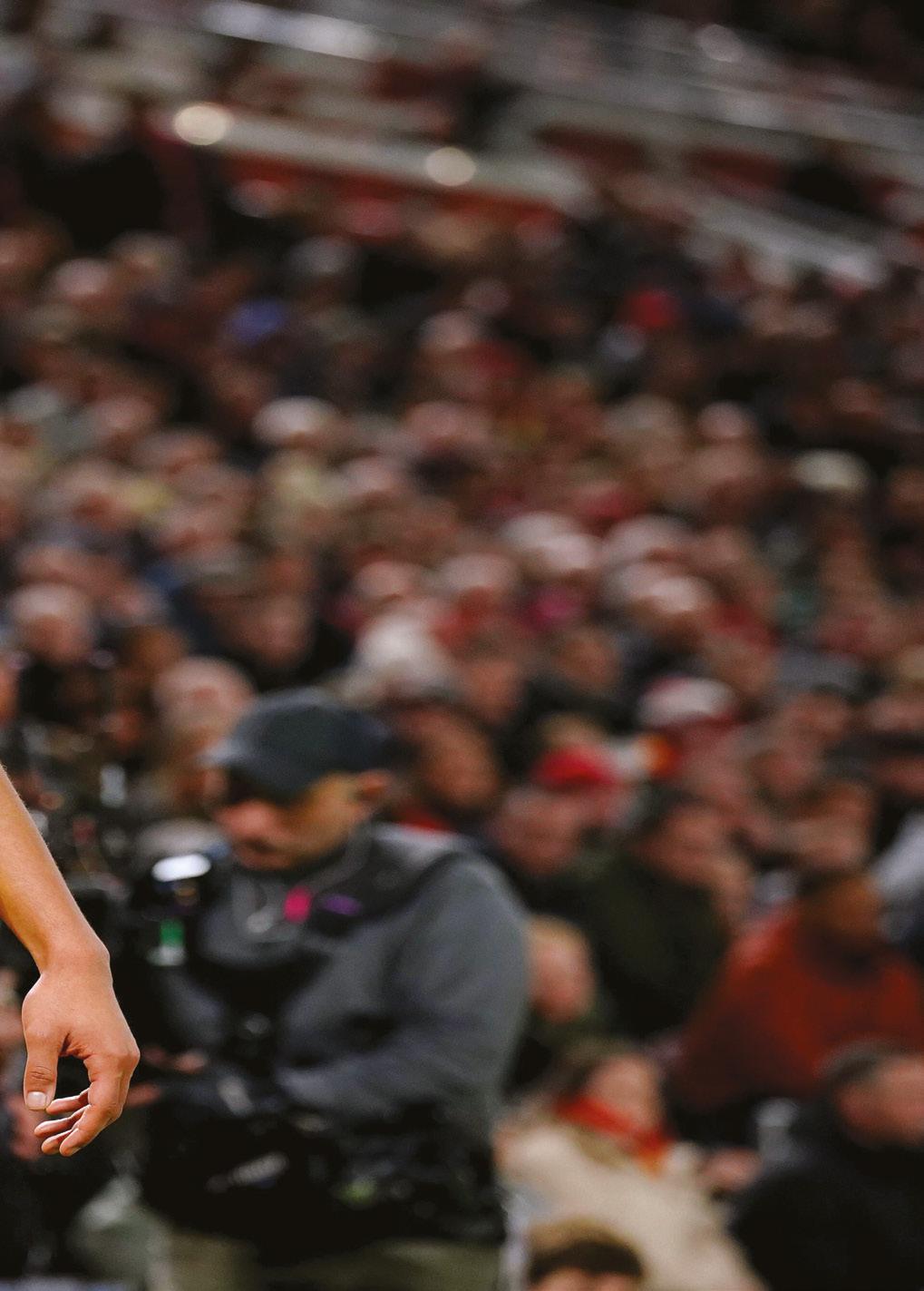
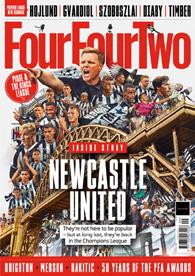

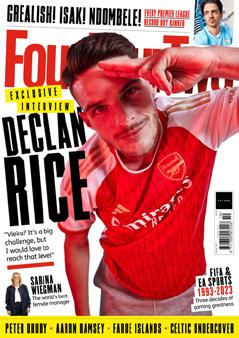
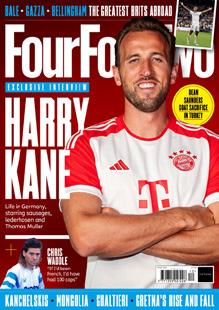
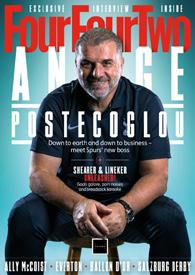


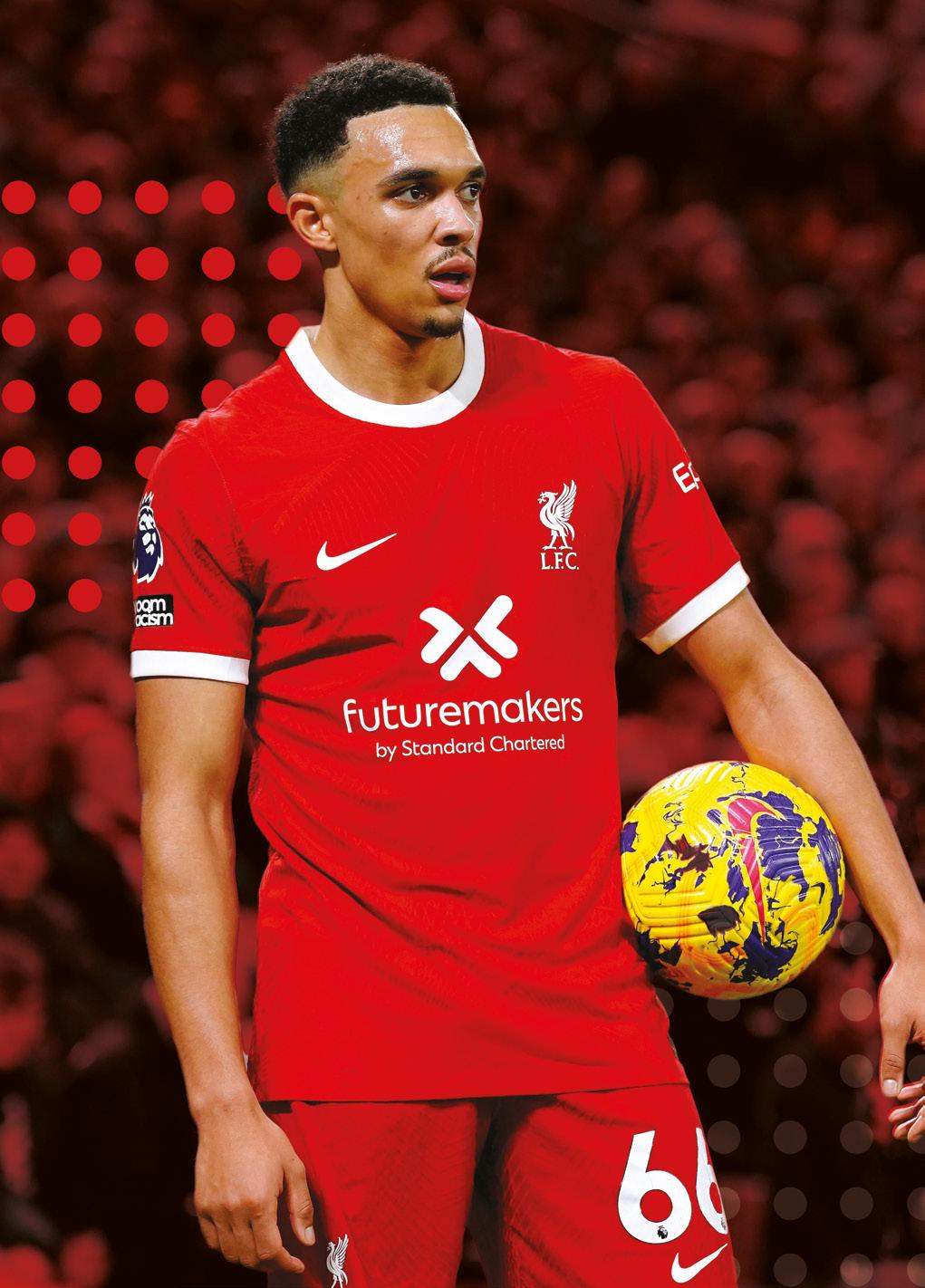
“I ALWAYS THOUGHT THE SKILL SET I’VE GOT IS BEST SUITED TO THE MIDDLE OF THE PITCH”
Alexander-Arnold explains his hybrid role – and his admiration for Brighton

Your role has changed recently, moving from full-back to central midfield when Liverpool are in possession. When did those conversations start, and what was your reaction?
I was excited. It was a couple of days before the Arsenal home game last April – the 2-2 draw – but we didn’t have much time to work on it. I always felt, without putting a label on it, that I’ve been given freedom – not so much to play as a double six or right in midfield but being able to drop into a back three, or push up high almost like a rightwinger, or take possession in the right half-space. I’ve been able to create for eight years, so we didn’t change too much. In my opinion, I’ve always believed that the ability and skill set I’ve got is best suited to playing in the middle of the pitch. You get the best out of my specific skill set by playing in the middle, and I saw it as an opportunity to show the world that. That’s what excited me.
When you’re approaching a game now, do you try to focus on the defensive side of your role, or are you thinking about how you can impact the game from the middle?
Both, to be honest. My main focus always has, and always will be, what I need to do to help the team win the game. Whether that’s defensively or offensively, I’m prepared to do that. People will talk about the games where I’ve been able to dictate the play, but there have been matches where I’ve had to be more defensively sound and not been able to get on the ball. For me, it doesn’t matter. I like to impact the game at both ends of the pitch. If the feeling of the match is that I’m not going to get the ball too much and not be able to dictate things, then you have to find another way. If that means defensively doing your job as well as you can, stopping the attackers and getting a clean sheet, then I’ve helped the team to win the game.
Does any particular game stand out where you realised that system was a great fit for you, and was going to work long term?
I’d say it was gradual, and already it’s evolved and been adapted in many ways. I think the first game that worked amazingly was when we played Leeds away in April last year, right after we played Arsenal. We won 6-1 and I think I had the most touches and most passes – I’d like to see all of the data. I thought I dictated the game and that’s when I said, “Yeah, this will work, it’s natural.” I was moving, I was on the ball, I was able to do what I needed and so was everybody else.
When you win 6-1, that usually means you’ve done something right.
But then there have also been games where I’ve been man-marked, I can’t get on the ball, I can’t really do anything and I have to think, ‘How do I make things happen?’. Looking back to the Aston Villa home game this season, there was a big contrast because we played them at the end of last season and they were so compact, so tight, that I couldn’t get on the ball. I felt restricted and couldn’t do anything. This season, we changed things and adapted. I was dropping to the backline, and because they were still tight with a high line, I was able to play balls in behind and it worked that way – similar to Arsenal at home this season when I was spraying balls into Mo Salah. So, it’s changed and it’s adapted. It’s not a set mould where it’s very restricted and rigid. It’s free-flowing. I have that freedom to be able to just feel where’s right.
The England announcementssquadnow always seem to list you as a midfielder. Is that how you see yourself in the team?
Yeah, I think so. For England, I’d say I’m now a midfielder and that’s something that really excites me and gives me the opportunity to get into the team. I think if it’s working, then long term I don’t see a reason to change that. You’ve got to judge it all off performances and the results.
Have there been many other teams this season who’ve stood out to you tactically?
Probably the most interesting team over the last year or two in the Premier League have been Brighton. When I’m able to watch one of their games, it’s always entertaining and free-flowing football. The way that they build up and play out from the back is exceptional and really brave.
Is Brighton’s approach just as enjoyable to play against, though?
Oh, it was an absolute nightmare to try to stop it! Yeah, that’s a very, very difficult game.
It’s probably too far away to think about, but given how you’ve learned and adapted, have you ever envisaged becoming a coach in the future?
Er… [thinks]... no, I haven’t. Not yet, anyway. In fairness, it’s something I’d never rule out as the passion I’ve got for football is something I’ll never lose. Potentially, further down the line, I could see that happening, but I’ve still got loads of learning to do within the game. Hopefully there’s still hundreds of matches left for me to play, so I’m excited about that first and foremost. Then, who knows what will happen about management?

































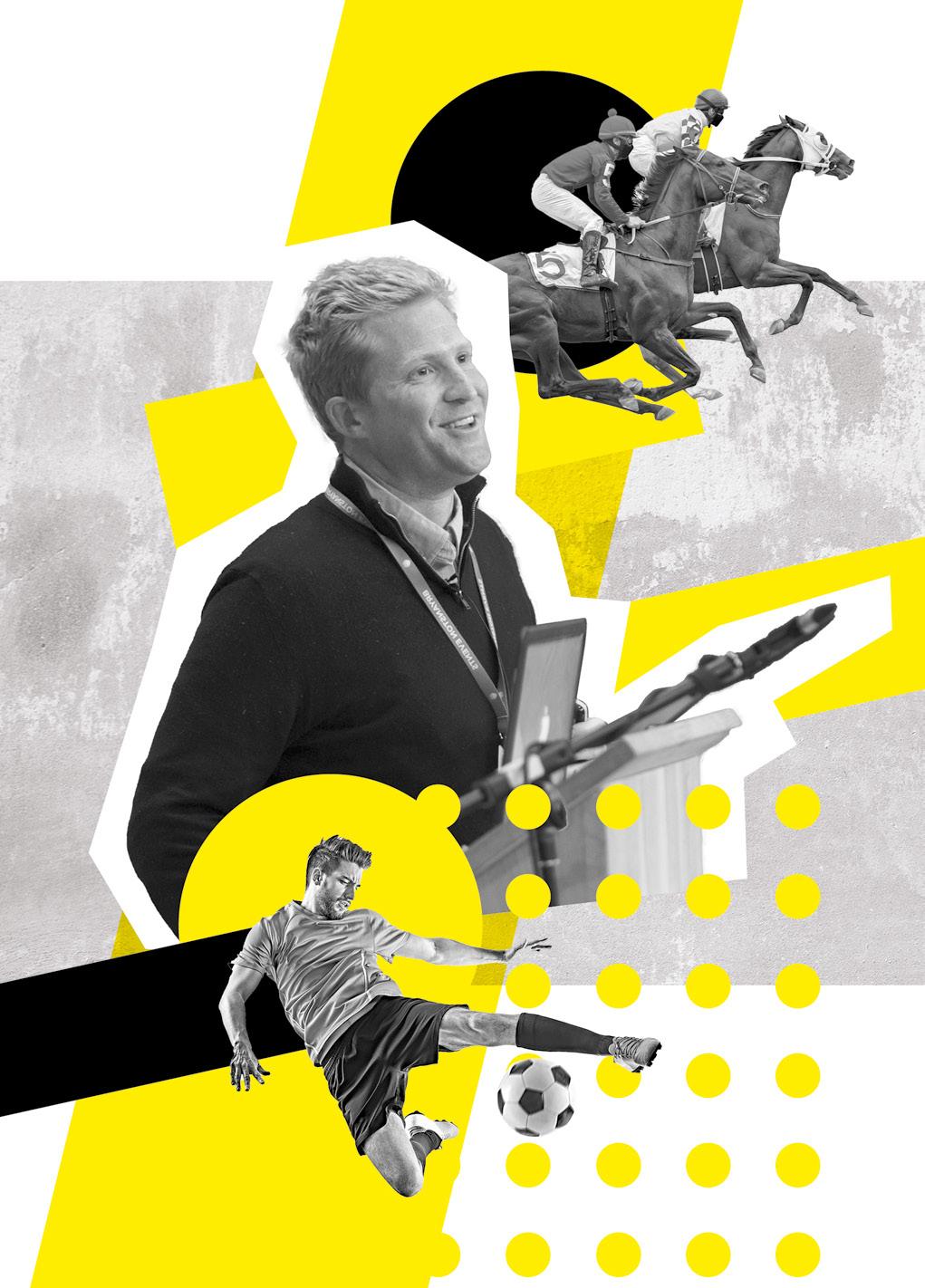
At the age of 19, Patrick Foster was living the dream. Enjoying his first year at university while being paid to play cricket for Northamptonshire, his future was full of exciting possibilities and opportunities. But a trip to a local bookies and a 37/1 twist of fate set his life down a very different path – one that very nearly had a dead end.
1
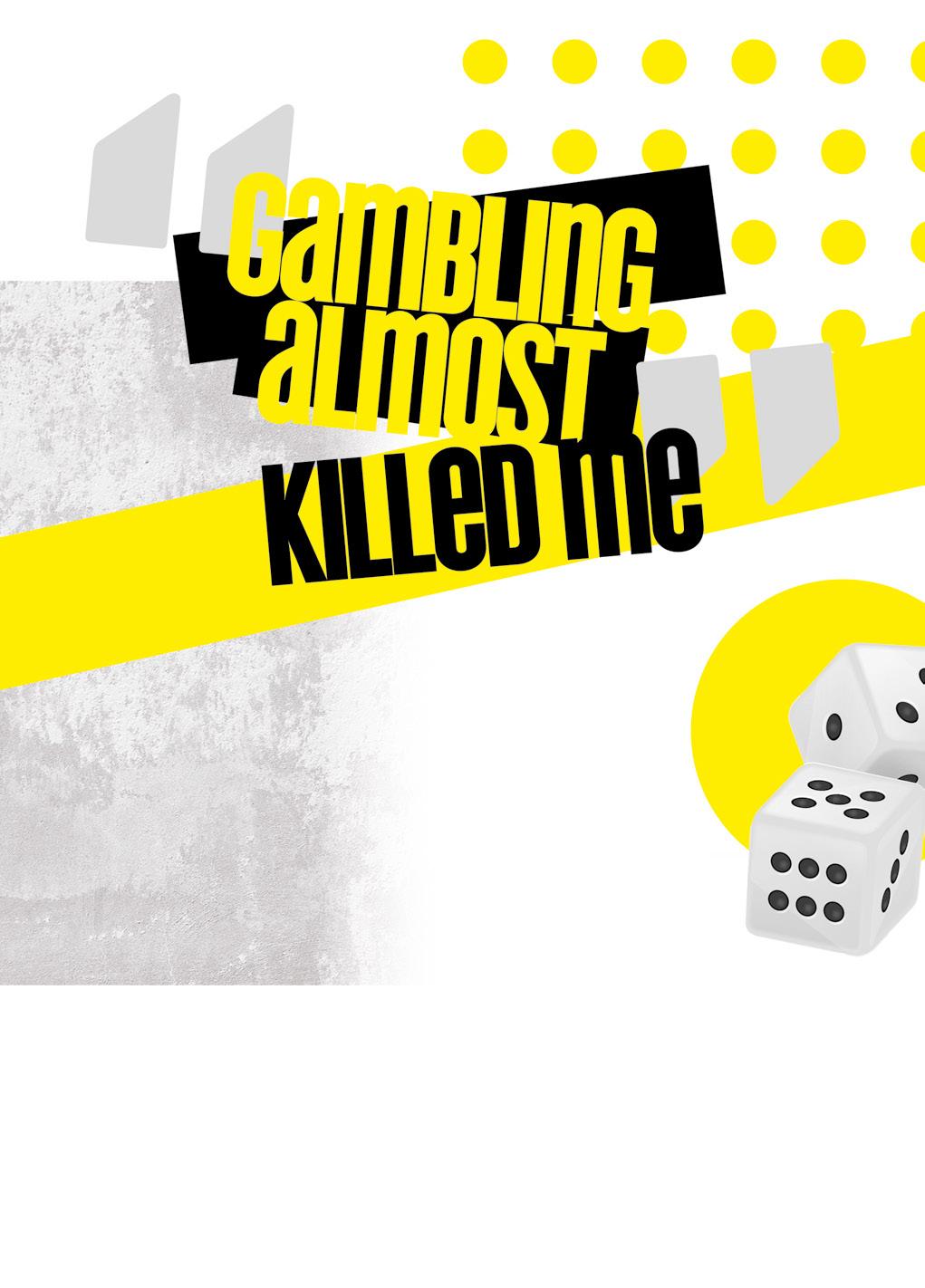
It was two weeks into my first year of university. It was a Saturday morning, we were all a bit hungover from the night before, and a few lads said they were going to the bookies to put some bets on the football. I didn’t have anything better to do, so I thought I’d go along.
We walked into a betting shop in Durham and I put two quid in a roulette machine, because that’s all I had in my pocket. I put it on green zero, because it was the only number that was different from all the others and I could see it was the last number that had come up. And it won. I didn’t realise it at the time, but I think the fact the first bet I’d
ever placed had won was massively significant in my journey.
IF THAT BET HAD LOST, DO YOU THINK THINGS WOULD HAVE GONE DIFFERENTLY FOR YOU?
I’ll never know the answer, but I was incredibly competitive and a very bad loser. So I think the fact that it won – when winning was kind of what I lived for – had a really significant impact. I think if that bet had lost, I probably still would have gambled, because that’s what a lot of people did and it goes hand-in-hand with my sport, but I don’t know if it would have had the same impact on my brain.
I think for some people their early experiences with gambling dictate how it goes further down the line. I know plenty of people who lost every bet they placed when they first started and think ‘Well what’s the point of doing this?’ I think I just thought I was going to win all the time.
After a while the lads and I walked out of the shop, but I went back in there later on my own. I won a few more bets that day, and again I think that was hugely significant because it just made me think it’s fun, it’s easy, you win all the time, so why wouldn’t I do more of it?
3
When you stopped winning all the time, did that not change your thoughts on it?

didn’t. I was more focused on the feelings, and there was something about the environment that I just found intoxicating. I just loved the bookies. There was sport everywhere. There were 10 different sports on screen. There was a real buzz in there. And I loved the instant response you could get from betting. All of that clouded the logical thinking.
4

I never really considered the logic or the maths behind it. That seems mad as someone who’s not stupid, but I really
Was it an instant addiction or did it develop over time?
I don’t think anyone’s addicted straight away, but I was hooked. I loved it. But in the early days I was in control of it, because it was time and money I could afford to lose. I was being paid to play cricket, so I had more money than my mates and other students. Of course there were better things I could have done with the money, but I wasn’t getting myself into debt.
5

Were you gambling on your own or was it still with mates?
It was a combination of the two. When I was around other people, I was very conscious of judgment, so I’d bet less than I did when I gambled on my own. A lot of my mates did it and we used to spend hours in there together.
As the year went on, there’d be times where I was in the shop on my own and some of the other guys would come into the bookies together and find me there. I used to hate that, so I started to drive a couple of miles away to other shops where I knew no one else would be.
6
What caused your gambling to escalate?
I went back to play cricket the first summer of uni and found that because of gambling, I was different. it would be very easy for me to say that gambling stopped me from becoming a professional cricketer for the rest of my career, but that wasn’t the case. I wasn’t good enough. But it impacted it because I needed to be the perfect professional and suddenly I wasn’t –because I was gambling.
Then I got released in 2007 and that had a massive impact. Gambling was a way of replicating the rush and buzz that I used to get from playing sport. It was a boredom coping mechanism, something to do where I would previously have gone to the gym or done extra practice.
When I finished uni, I was one of those people who didn’t know what I wanted to do, because I’d always wanted to play sport. I was a bit lost. I went into the city and got a job in insurance. I didn’t know anything about it and wasn’t interested in it, but I just wanted to be in London with my mates and make as much cash as I could. That gave me access to more money, so then I was able to gamble more. in December 2010 everything changed when I won £35,000 on a football accumulator. That was the biggest turning point, because overnight my gambling went from amounts of money that I could afford to being totally unaffordable. I went from putting £10-50 on a horse or a spin to betting £100-500, in the hope I could get more of those huge wins. I lost it all in a matter of weeks. And then my immediate thought was, ‘How am I going to get it back as quickly as possible?’ I tried to win it back, but I started to lose, and then I started to spiral. I was constantly chasing, and then started to deal with that by drinking a lot, taking drugs, and life started to go in a very different direction.
\\ I TRIED TO WIN IT BACK, BUT I STARTED TO LOSE, AND THEN I STARTED TO SPIRAL //
supplement my income. I wasn’t earning as much as I was in the city, so I thought I could gamble and still have as much money. But, of course, the opposite happened.
By the summer of 2011, I’d properly lost control of everything. I’d built up debt. I’d put on a lot of weight. I wasn’t remotely interested in my job. I thought I’ve got to do something about it, so I decided to escape London.
I became a teacher, because I’d always thought I might do that because that’s what my parents did, and I thought if I changed my environment and lifestyle I’d be able to get rid of my gambling problem.
For a short period of time, when I first started teaching, it did actually get a bit better. But that was probably one of the worst things that happened, because it made me believe that I could control it and turn it on and off like a tap. But underneath it all that wasn’t the case. I went back to it and it started to spiral.
7 8 9
The school holidays were a big turning point. I had so much time on my hands; I was a single bloke and I was bored. I literally used to spend all day in the bookies. And I still thought gambling was a way to

10
It was as bad as it gets. I’d taken out quite a few loans and I just kept getting myself into more and more debt. My salary wasn’t even covering the minimum payment on my debt each month, so I started not being able to pay off debts. No one would give me another credit card or another bank loan, so I started turning to payday loans. I had around £100,000 of debt and there was no way for me to get money anymore. I was like, ‘Right, I need to gamble my way out of it’ and that was the first time I ever approached a parent of a pupil I taught for money.

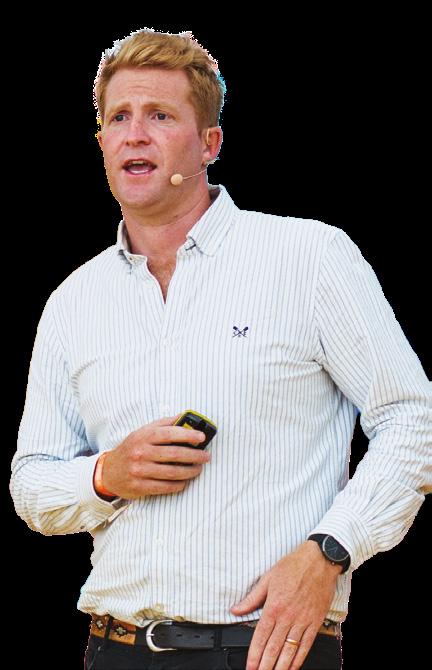
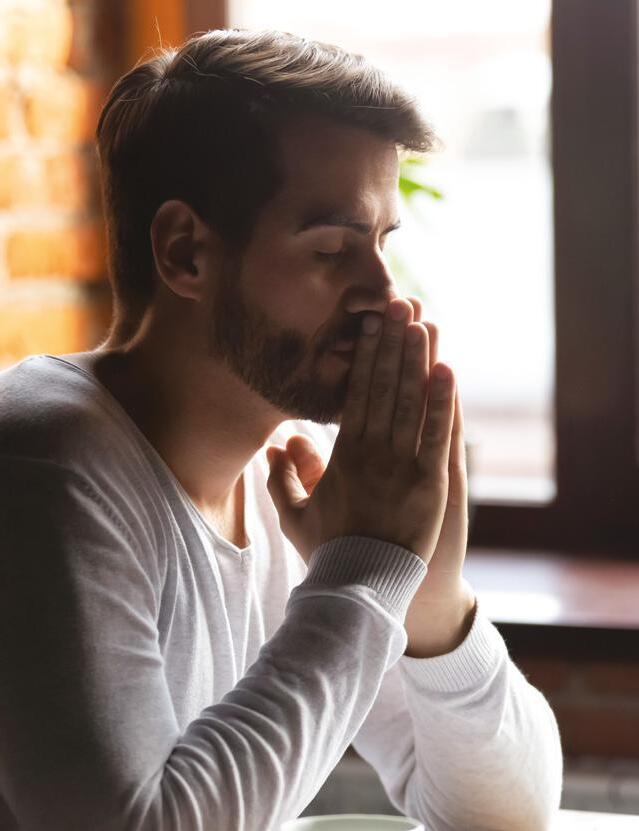
\\ IF I’D
I was very aware that a lot of these people were wealthy because they sent their kid to a school that costs a certain amount and I knew what jobs they did. I reached out to somebody and said, ‘Look, I’ve been hit by an unexpected tax bill, I’m in a bit of shit financially, would you be able to bail me out and I’ll pay you back in instalments over the course of the next year?’ It just so happened that they transferred me some money – I think it was about two and a half grand – literally a minute after I’d sent the email. I thought, ‘Oh, I’m on to this now,’ and I just kept doing that. I knew that even if I couldn’t pay them back, these people wouldn’t miss that amount of money.
Always. This is a problem with a lot of gambling addicts – I always thought I could get myself out of financial trouble by gambling. My plan was always to gamble my way out of financial trouble and then stop. But, whenever I got close, I lost it all.
thought I was going to go to prison because I’d done loads of things that people don’t know about. But still in the back of my mind I thought I could gamble my way out of it. It took me to be on the verge of suicide, and having attempted it in various different ways, to do something about it. It had literally become a matter of life and death. It was either I’m not here anymore or I do something about it.
I made the best decision and decided that I’d done everything I could except tell people. So that’s what I did, and fortunately that was the beginning of the end.
11 12 13 14 15 16 17
I think the problem with addiction for a lot of people is it takes losing something they really care about or value before they can start to change things, whether that’s a relationship, a job, or a house. For me it was all of those. I knew I was going to lose my house and my job. I
I reached out to my brother. I thought I’ve got to tell someone what I’m about to do, but I think, deep down, it was also a massive cry for help. It was, ‘I don’t want to do what I’m about to do’.
My brother told my parents and about two days later I went to rehab. I spent months having intensive therapy, counselling, and support.
A big thing for me was I wanted a quick fix and to be ‘cured’. I had to realise that wasn’t going to be the case and that this was something I was going to deal with for the rest of my life. I needed to be in a very secure and protected environment. I needed to connect with other people that were in similar situations.
Those few months, with the support of my family and friends, combined with determination, allowed me to move forward. I realised pretty quickly how much better my life was without gambling. But that was just the beginning of the journey.
Definitely. I’m an addict. My addictive personality manifests itself in all sorts of weird and wonderful ways. But I’ve learnt to be at peace with that and learnt to manage it and use it in a positive way. I had to realise that nothing was going to replace gambling directly. I’ve never found something to replace it, but I’ve found things to serve the purpose that gambling did.
I’m at peace with the fact that I can’t gamble. If I was a smoker and a doctor said to me, ‘If you have another cigarette, you’ll die’ I wouldn’t have one – that’s how I view gambling. I don’t have any desire to gamble, because I know I’m so much better without it, but the threat of relapse is always there and very real. I just have to take it day-by-day and manage it, but it gets easier.
You can of course help but it has to come from the person. It has to be self-driven for it to be successful. It’s not just about stopping; it’s about getting to the bottom of what’s driving it – otherwise you just stop one thing and replace it with something else.
21
the solution to the problem as well as the cause, but it never will be.
What
made you
decide
to write a book about your experience?
things have filled the gambling void for you?
Exercise has been a massive coping mechanism, because I get the endorphins I might have got from gambling. I’m an obsessive runner and whilst I have to manage that, at least that addiction is having a positive impact on my physical and mental health.
Talking is so powerful. I’m very open and honest now, whereas before I was like a closed book. Talking through things makes me feel so much better.
My work gives me a real purpose. I find that very rewarding.
I was very concerned about my relationship with sport, in terms of how could I enjoy sport if I don’t gamble on it – but actually I love it more than ever. I just enjoy it for what it is, it’s not stressful. I go and watch live sport as much as I can, which again gives me a bit of a rush and a buzz.
What do you think your life would look like if you hadn’t stopped gambling?
As extreme as it sounds, I pretty much know that if I’d carried on gambling I’d be in prison or dead. I was pretty close anyway and that was the way it was going. I now realise that no amount of money I could have won would ever have been enough.
The last bet I ever placed, it was the best thing that happened that it didn’t win, because if it had I would have just carried on gambling.
18 19 20
Could people have helped you sooner?
I think that one of the really scary things about addiction is that it has to come from the individual.
People often tell me they’ve got someone they know who’s really struggling with gambling or another addiction and want to know what they can do to help.
Try to remove any judgment. That’s what an addict or anyone suffering with any sort of mental issue is most fearful of: ‘What are other people going to think? People are going to think worse of me.’ The shame. If you can break down those barriers and remove that, it’s huge.
Act on your instincts. So often people avoid it because it’s such a difficult conversation to have, or they’ve tried before and the reaction wasn’t what they wanted. You have to keep going and keep trying to intervene. You’ve got to be quite forceful in some on your interventions. People are fearful of an adverse reaction but often that’s what the person wants or needs.
22
It’s a cliché, but one of the most important things is to know you’re not alone. There’s an awful lot of people going through whatever it is that you’re going through, whether it’s gambling, other addictions, or problems with mental health. Although it feels like you’re alone, there’s always somebody else.
People say the opposite of addiction is connection, and I think there’s very good reason for that. It definitely helped me understand that I wasn’t the only person that was doing the things I was doing and thinking the things I was thinking.
People’s reaction is often very different to what you think it’s going to be. In my head I’d played out, ‘I know how X, Y, Z is going to react’, but they reacted in completely different ways to what I thought.
It takes real bravery and courage to talk to someone, but until that point you can’t really move forward. The consequences of not doing anything about it are worse.
Most gambling addicts think that gambling can be
It’s a cliché, but I genuinely wanted to help other people. I didn’t want one person to go through what I did. I realised that I was pretty naïve; I wasn’t really aware of the dangers and pitfalls of it. I didn’t realise it could be an addiction.
I wanted to raise awareness and reduce the stigma, because I would have found it much easier to admit I had a problem with drugs or alcohol than to admit to a gambling problem.
I want to encourage other people that are going through difficulty to do something about it and realise that there is a way out.
Patrick now runs GAM-Ed (gam-ed. com), an organisation to educate people about addiction and help them maintain good mental health.
His book, Might Bite: The Secret Life of a Gambling Addict, is available now.
23 37
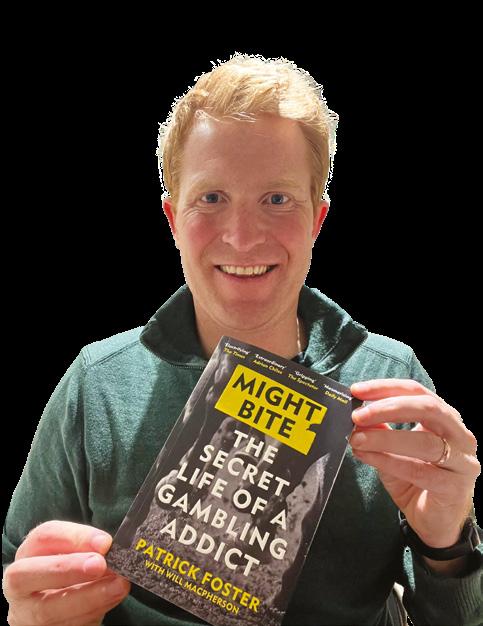
THE
SPECTATOR
‘Mesmerising’
‘Gripping’
DAILY MAIL
‘Mesmerising’
DAILY MAIL
‘Gripping’ THE SPECTATOR
DAILY MAIL
‘Mesmerising’
‘Gripping’ SPECTATOR
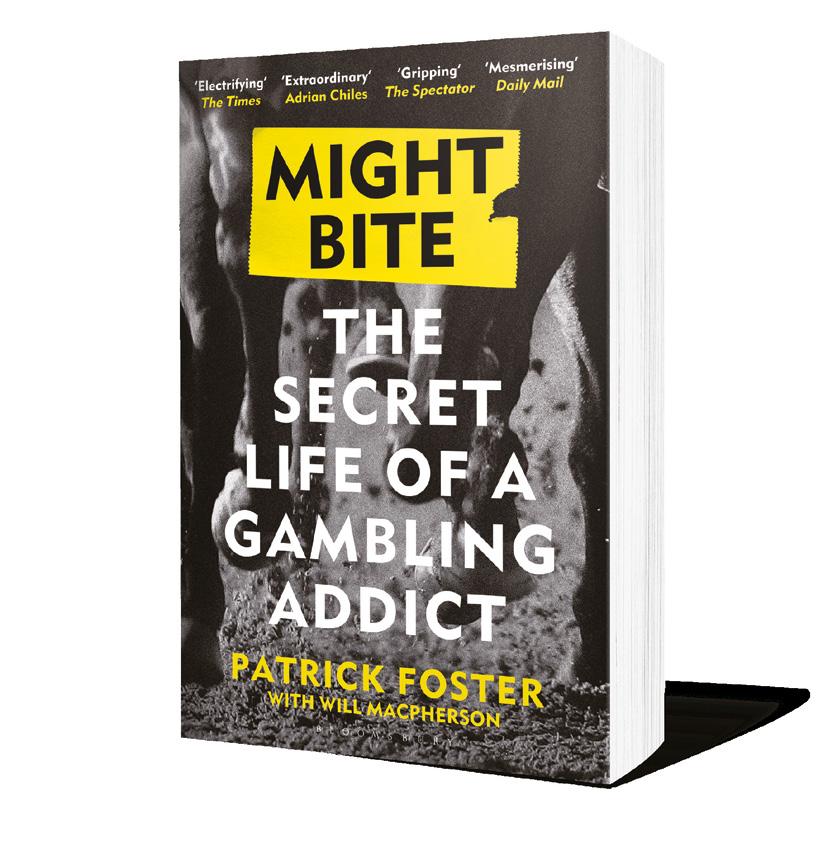
‘Electrifying’ THE TIMES
ADRIAN CHILES
‘Extraordinary’
THE TIMES
‘Extraordinary’ ADRIAN CHILES
‘Electrifying’ THE TIMES
‘Extraordinary’
ADRIAN CHILES





Psychotherapist and Mental Health
Consultant Gemma Pettit offers a reader advice on how to break out of a negative cycle to build a happy and fulfilling life.
I feel really dissatisfied with how my life has turned out. I hate my job, I don’t feel like I’ve achieved anything worthwhile, and I don’t have the money to buy my own place and feel like an adult. I know the obvious answer is to do something different, but I work a lot just to pay the bills and am normally pretty tired in the little spare time I do have. I feel really trapped and don’t know how to get out of this cycle, but I know I’ll regret it if I don’t.
Thanks for any advice you can offer, Gav

\\

It’s amazing how much people can convey about themselves in so few words. I feel hopeful I can be of some help in addressing the concerns you highlight in your letter.
Firstly, I want to offer my sincere appreciation of how much energy and effort is required to make any kind of change. Wanting or needing to change can be a scary thing to admit, so It’s important to respect the part of you that knows things don’t feel quite right. Where certain parts of your struggle involve external factors like the unstable housing market or cost of living increases, your feelings of being trapped and the fatigue that accompanies working to stay afloat are really understandable. One of the most useful pieces of advice I received early in my career was not to burn precious energy on things we have no ability to control. Remembering this, I believe my response would be most useful focusing on the things that are within your power to change and to offer some steps on how to begin this process.
One indicator of high stress is black & white thinking: A way of relating to ourselves and our situation that is marked by rigid and binary beliefs. Your comment “achieved anything worthwhile” suggests you may be experiencing your situation in this way. I’d like you to start by checking the validity of your statement. Have you really not achieved anything worthwhile in your life? The fact you were motivated enough to send me this letter suggests otherwise. I’d encourage you to spend some time reflecting on any memories or experiences that have felt worthwhile to you. These don’t have to be huge achievements and might instead be as simple as a time you were kind to a person in need, completed a hard piece of work, reached an exercise milestone, or were brave enough to be honest with
yourself about something you didn’t like.
It might be the case that you recognise you’ve temporarily lost connection to some of the behaviours or qualities you once admired in yourself. (If this feels true, then also give some thought to what might have prompted this disconnect?) I want to reassure you there is no reason things have to stay like this because those qualities are still within you. Start by considering some small adjustments and realignments that could begin to steer things in the right direction. Remember that big change can only occur as a series of small changes. If we feel overwhelmed by the changes we need to make, it’s usually because the step we are attempting is too big for us to make in one go. It sounds like you’re ready to start this work, and I really encourage you to start small and stick with it.


\\ I’VE NEVER MET A PERSON WHO HAS BEEN ABLE TO JUDGE, FRIGHTEN OR EMBARRASS THEMSELVES INTO
In support of making these adjustments, I notice my curiosity at how your use of language suggests you are motivating yourself to do this: “Dissatisfied… nothing worthwhile… trapped… regret.” These are very emotive words that typically accompany negative beliefs about oneself. These beliefs might relate to feelings of inadequacy, helplessness and embarrassment about yourself or the situation you find yourself in. In my practice, I’ve never met a person who has been able to judge, frighten or embarrass themselves into a life that feels positive for them. Instead, it’s important to meet yourself with compassion, kindness and curiosity.
There is usually a very good reason for why we’re experiencing what we’re experiencing. A favourite quote of mine from psychotherapist Carl Rogers reads: “The curious paradox is that when I accept myself as I am, then I can change.” It sounds like you’re attempting to make change without acceptance, so I’d strongly encourage you to start with acceptance first.
“How do I do that?” I hear you ask. Well, this reflection links to my final curiosity around your phrase: “Feel like an adult.” In your letter you link your adult worth to practical success in the form of buying a house. I found myself wanting more information about how you came to formulate what feeling like an adult means to you. I’d be keen to learn where, how, or who you got your idea of being an adult from? As a therapist, I believe an adult is recognised by the qualities of the person, not their acquisition of material goods. These are qualities such as self-awareness, empathy, courage, patience, kindness, generosity, honesty, hope, ambition, and integrity. If we were taught to spend our time nurturing these qualities, then it’s likely that a feeling of success and security would follow.
I’d like to acknowledge the wider point that men have it particularly rough here! Boys are so often taught that their role in life is to be ‘the provider’. They are commonly raised in homes with a male figure that went to work and provided for the family. I find myself wondering if this was
your experience? Alongside this, boys are taught to supress their sensitivity, creativity, sadness and fear. Instead, they are permitted (if not encouraged) to feel competitive and angry, defining their success with material symbols like houses, cars or a high earning career. In reality, this gendered conditioning is deeply harmful to everyone.
\\ A MAN WHO IS ONLY PERMITTED
Whilst we are beginning to challenge the status quo, generations of patriarchal structure mean this type of conditioning and values system are often far more prevalent than we like to acknowledge. Sure, there is some happiness to be found with a nice house, fast car, and a secure job. But any boy growing into a man who is only permitted to focus on the external success will inevitably find himself battling many of the feelings and much of the dissatisfaction your letter implies.
My recommendation is this: Go inwards and find a way to reconnect with your true self and the values he holds. Spend some time getting to know the person you really are and always were. If it doesn’t feel possible to do this alone or in the company of trusted friends or family, then some therapy to help uncover this inner voice and find the answers you’re looking will be a hugely worthwhile investment.
At the bottom of this letter, I’ve included an exercise to begin the process of reconnecting with your inner knowing. My hope is that creating an understanding of any changes or course corrections you want to make will provide some fresh insight that will be energising enough to break the cycle you’re experiencing.
I hope this helps.
Warmly,
In this exercise you’re going to embody a man in his 80s who feels proud and content with the life he has lived. This exercise will help you begin to understand more about your real values and internal desires in order to offer a glimpse of how to make the changes that are right for you going forward.
To do this exercise I recommend sitting somewhere quiet and comfortable, and closing your eyes. The more you are able to connect with your body and hear the honest answers it offers you, the more you will get from this.
Sitting comfortably, I invite you to take a deep breath in. Exhaling slowly, I’d like you to close your eyes and imagine your attention dropping down into your chest and connecting to your body. It’s our bodies that hold our truest answers…
You now experience yourself in the body of a healthy and content 80-year-old man. You are sat on a porch looking over a calm and peaceful view. You are in a comfortable chair, feeling the warmth of the sunshine and the coolness of the air as you relax into the early evening in front of you. As you sit on your chair looking out over the view, you notice a feeling of pride and contentment in your chest. You feel deeply content with the life you have lived and you permit yourself to answer the following questions so you can find out more about the life you’ve experienced…
Where are you right now?
Is this a holiday home, a friend’s house, a family home? Are you alone or
are you there with other people? How many other people are there? What is their relationship to you?
Have you retired? If so, what age were you when you retired? What job did you retire from? Did you live to work or work to live? What work/life balance worked best to you?
What hobbies did you have aged 30, 40, 50, 60 and 70? What hobbies do you have now? What did you do with your free time that made you feel most energised and what made you feel most at peace? What would you like to have done more of?
Who are the people in your life that have been the most important to you? Did you marry? What made your happiest in your romantic and platonic relationships?
What are the qualities of the people in your life that you admired most?
What are the difficult conversations you’re most proud of yourself for having? Who were they with?
What wisdom would you want to pass onto a younger version of yourself that felt stuck? What do you need him to know about how it all turned out? How were you able to get it to turn out this way?
What do you wish that younger version of you that wrote this letter knew? What would you want him to unburden himself of? What would you encourage him to focus on? What do you like about him? What do you hope he has the courage to change?
You take a moment to contemplate his answers and stare out over the view once more. You allow yourself to connect again with the feeling of contentment and calm that it all worked out. You take a deep breath in and out. Then, you open your eyes and return to the reality of the present moment.
Got a question you’d like Gemma’s help with? Visit gemmapettit.com
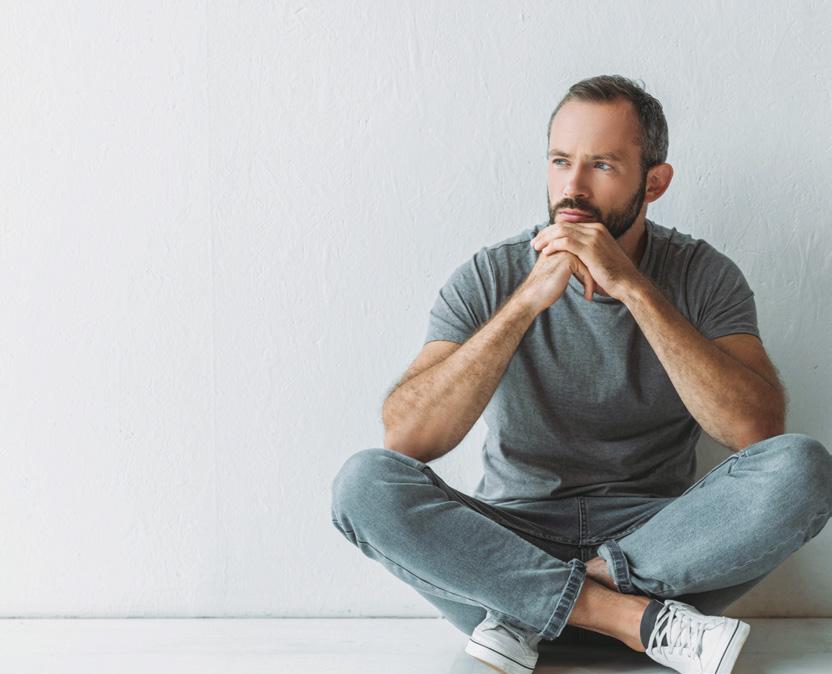
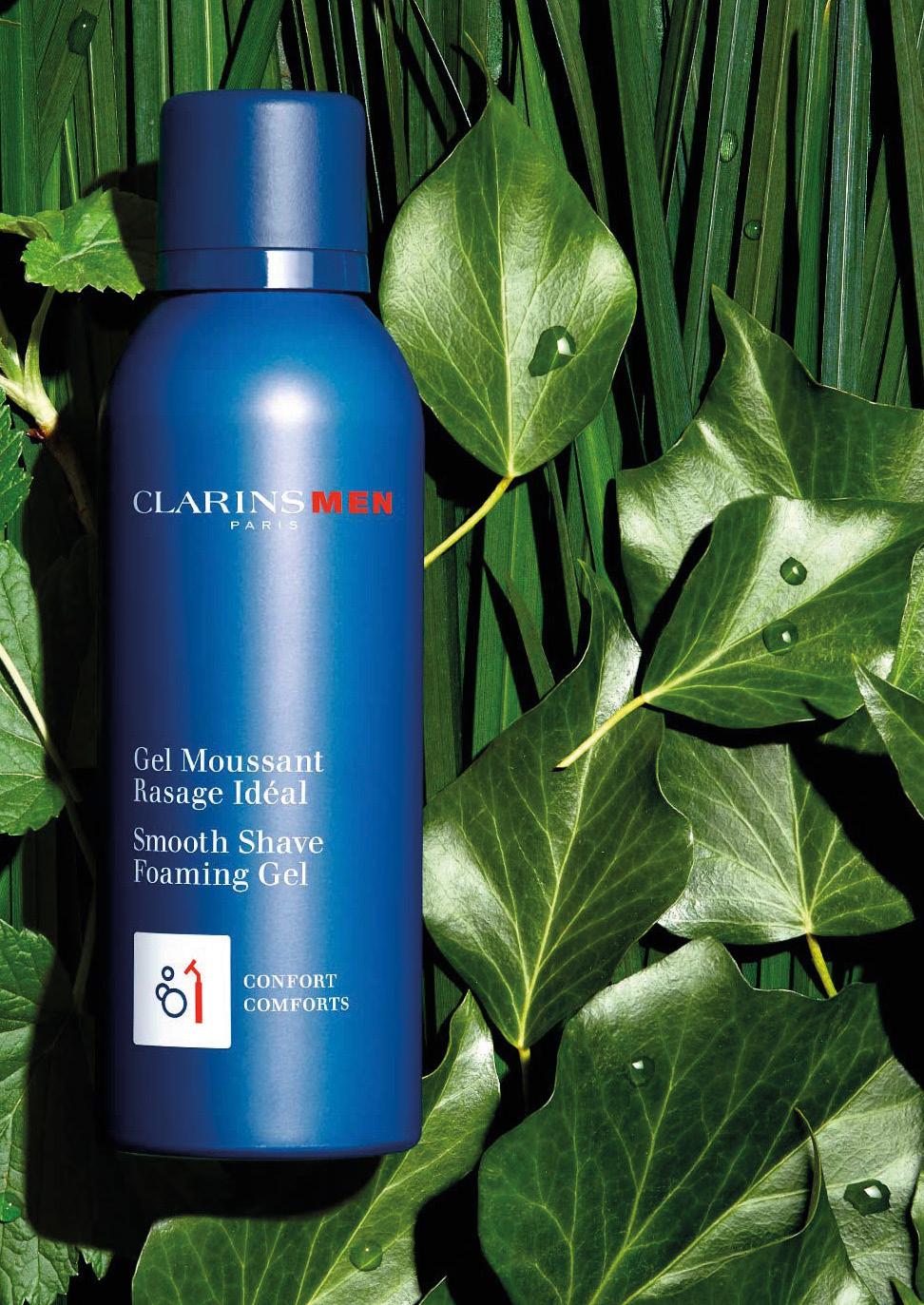
ClarinsMen Active Face Wash, £23.00
ClarinsMen Smooth Shave Foaming Gel, £19.50
Clarins Double Serum Eye, £59.00
ClarinsMen Super Moisture Balm, £33.00
Clarins UV PLUS Anti-pollution SPF50, £34.00

Scan the QR code to discover and shop your ClarinsMen routine.
Everyday stress and environmental aggressors can take a toll on your skin. A targeted men’s skincare routine is essential.
ClarinsMen products are tested and tailored to men’s specific skin needs. Boost your routine with these five essential tips.
Active Face Wash refreshes skin, washing away dirt, pollution and excess oil while preparing for shaving.
Choose a shaving gel that nourishes skin and protects it, like Smooth Shave Foaming Gel. Lather on every day.
To reduce the natural signs of ageing, use Double Serum Eye morning and night to prevent wrinkles and de-pu even after a late night.
You have to moisturise your skin, no matter your skin type, to keep it hydrated, healthy and protected. Use the non-greasy Super Moisture Balm morning and night.
Before any sun exposure, apply SPF to your face, opt for a water-resistant, invisible and non-oily formula like the Clarins UV PLUS Anti-pollution SPF50.
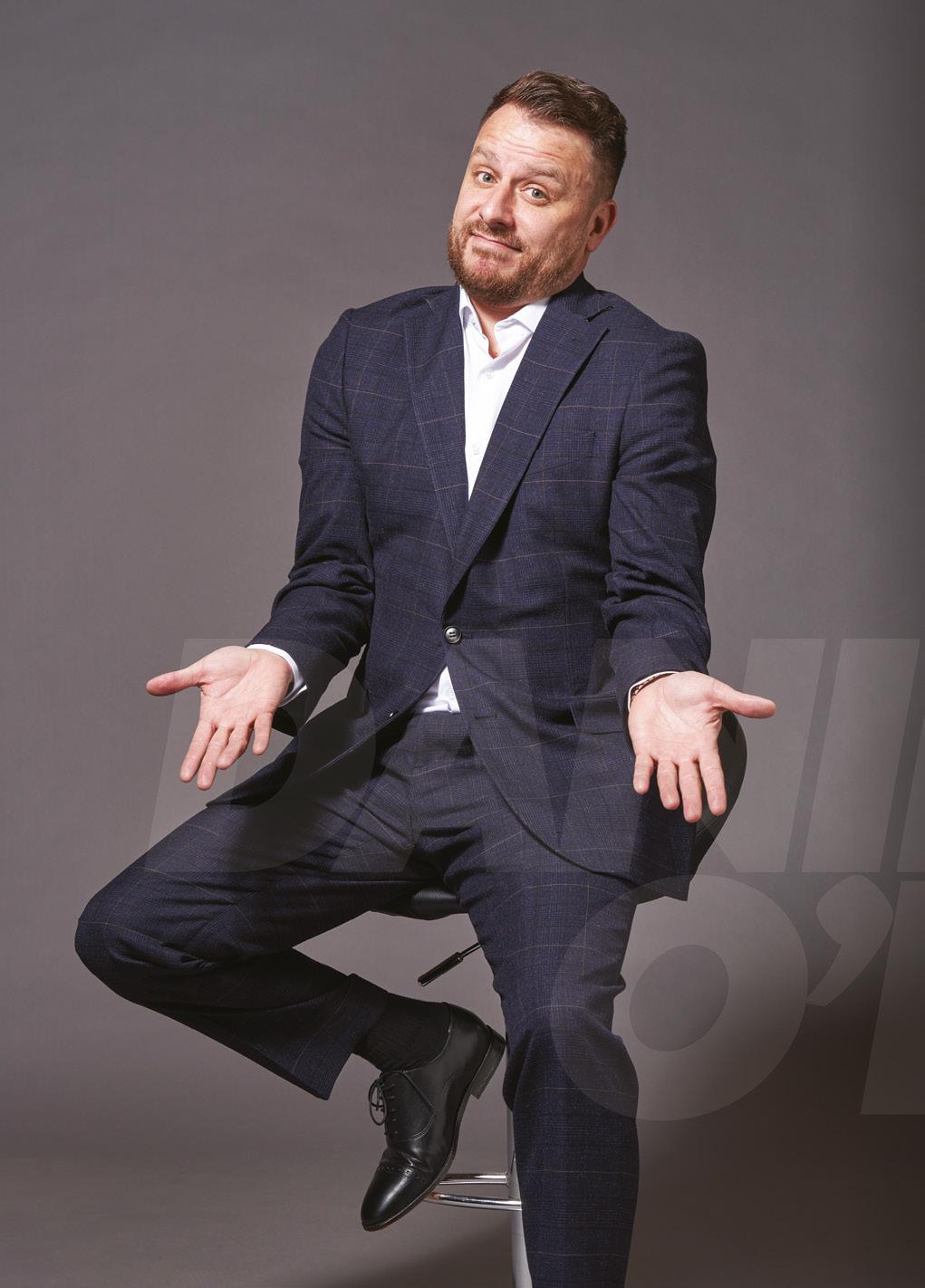
A decade after a misjudged joke saw his career go up in flames, Daniel O’Reilly is a changed man and wants a second shot.
years ago, comedian Daniel O’Reilly (you may know him better as ‘Dapper Laughs’) was riding high.
He had a huge social media following, a popular UK tour, and had recently landed his own TV show.
But the burgeoning success came to an abrupt halt. An ill-judged response to an audience member during a live set, captured on film, saw him branded pro-rape and ‘cancelled’ with almost immediate effect.
Virtually overnight he lost it all. The TV

show, the tour, his house, livelihood, and his reputation. An apologetic appearance on Newsnight failed to save him. When 44 comedians wrote an open letter condemning the “sexist narratives he champions” it was game over. He’d become toxic and no one would touch him.
The decade since has seen plenty of tough moments, including bereavement, drug and alcohol addictions, and relationship breakdowns, but O’Reilly has dug deep to overcome everything life has thrown at him.
He’s now gone over 600 days without alcohol or cocaine. He’s mended relationships and tackled his demons head-on.
WORDS ROB GRIFFIN
He is now back doing what he does best: making people laugh. His Out of Character tour has been playing to sold out audiences across the UK for five months. An initial tentative 10-date tour continues to see new dates added due to huge demand. By the time it finishes in February – if it finishes in February – he will have clocked up close to 60 shows.
However, the 39-year-old accepts his chances of burying the past Dapper Laughs controversies are slim to non-existent.
Here, O’Reilly explains the rise and fall of Dapper Laughs, that fateful night from his point of view, and why he wouldn’t change any of it.
Can you tell us about your early life and how that influenced you?
I had quite a turbulent home life as a kid. I loved my dad, but he had his
\\ IT’S TOUGH TO LOOK BACK ON BUT I WOULDN’T CHANGE ANY OF IT NOW //
own demons and I witnessed some quite bad domestic abuse when I was growing up that affected me later in life.
My parents had a horrible divorce and I didn’t see my dad for a long time. As I was finishing school, my mum went to live in Cornwall but I wanted to become an actor, so I moved out. I lived with my uncle for a bit, then started renting with friends when I was 16, before working on the cruise ships.
As I was living with my friends from such an early age, this is why my sense of humour is probably catered for a certain type of person.
Take us back to 10 years ago. What was happening at that point in your life?
I’d spent 15 years on the stand-up circuit and was the first to properly crack social media on Vine and Facebook before getting my own TV show, Dapper Laughs: On the Pull.
At the time I was really pushing the boundaries of my Dapper Laughs character, even though family and friends were warning me to be careful. I thought everyone understood it was just a character and that I had free rein to really push it, but I didn’t appreciate the responsibility that comes with millions of followers.
The more controversial and risktaking you are with content, the more viral it goes, the bigger your audience and the more money you make. I was riding this wave until it all came crashing down.
What happened that night with the rape comments?
The whole reason I was talking about rape was because my TV show had been unfairly called “A rapist’s almanac” in the Huffington Post. It was a stupid thing to say but I told the crowd that if that had been my aim I wouldn’t have written six 30-minute comedy episodes, I’d have done a one minute sketch advising them to buy duct tape. A woman in the audience shouted, “Don’t worry about it – my friend is gagging for a rape”. I repeated what she said and that was a huge mistake.
Those comments were pieced together in the media and I was branded a pro-rape comedian, but it was a response to an audience member that was taken out of context.
I deserved to get reprimanded but more than 40 comedians signed a letter to get me cancelled. I lost everything – my livelihood, money, house, television show, and tour.
I don’t know how I’ll ever change that perception. I don’t think I ever will. It’s a tough time to look back on but I wouldn’t change any of it now.
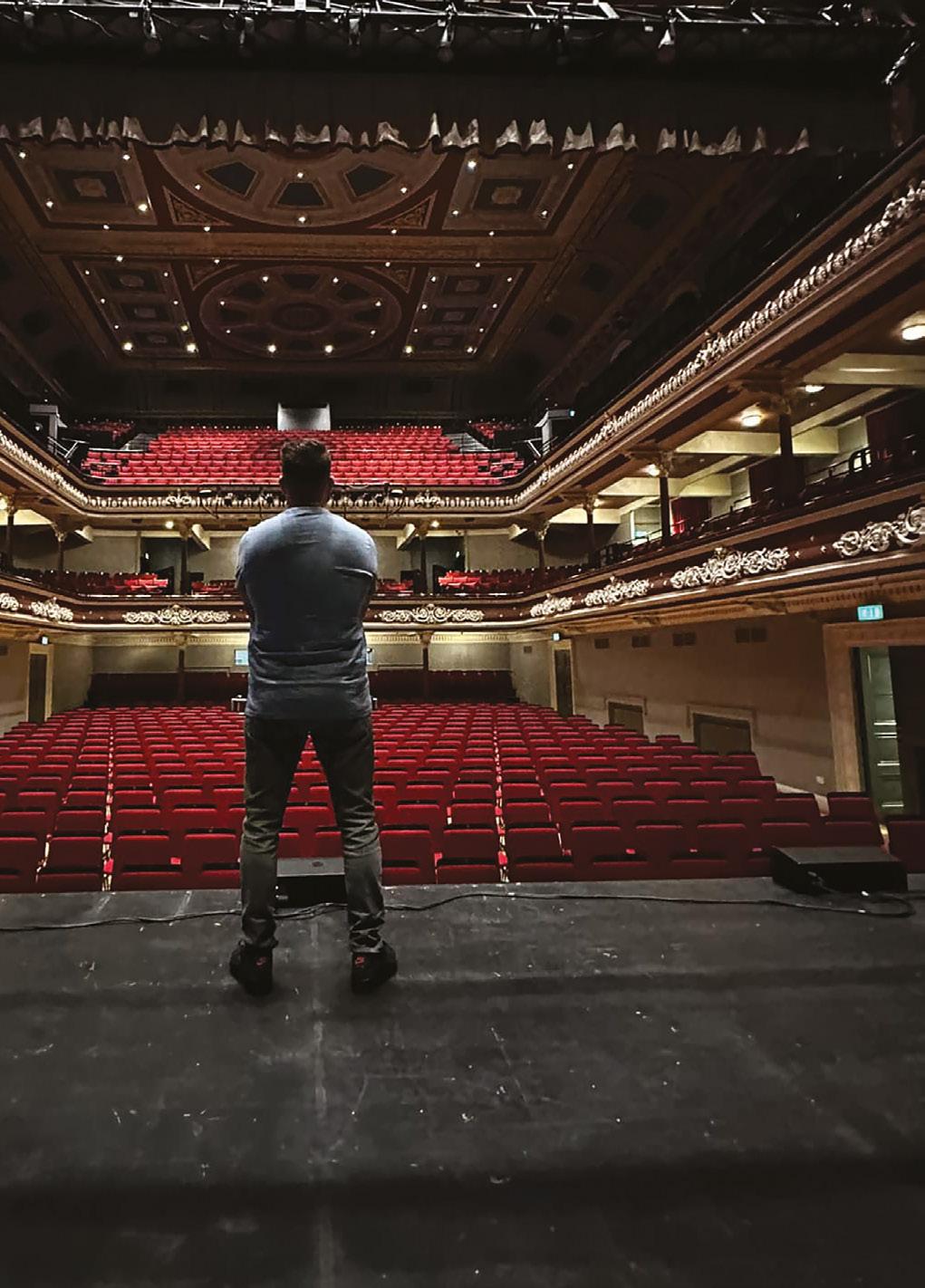
\\ I’D RESIGNED MYSELF TO NEVER BEING AGAIN // ABLE TO TOUR
Soon after being interviewed on Newsnight about the rape comments and getting cancelled, my father passed away. I was a real mess for a couple of years.
I couldn’t even tell you what I was doing for the first six months as I was heavily into drink and drugs and living on my own after breaking up with my girlfriend (now wife) Shelley.
At one point I even considered suicide. I’d just given up. Fortunately, I spoke to the Samaritans one night when I was at my lowest point.
I ended up getting back with Shelley, moved in with her folks in Manchester, and started to rebuild my life, but I was pretty lost for about two years.
I started different businesses, including a nightclub in Clapham and a film production company, as well as doing some stage work in the West End.
But whether I’ve had five followers or five million, I’ve always been fully addicted to creating comedy. It’s a sort of comedy Tourette’s. Even back at school I didn’t want to learn, I just wanted to make people laugh. Every day I wake up and my mind is telling me jokes.
Creating big characters and hitting milestones of viral activity spurred me on. When I created Kid Franky, he blew up so much that no one care what happened before. They loved him.
Then I created Jim and Steve during Lockdown. Boris and all the political madness that was going on was like a Godsend to me.
With each of these new characters that came out, I hid Dapper Laughs until I had the confidence to come back and start sharing my life and what I was doing.
I was secretly doing comedy gigs and open mic nights under different names just to feed my ego, keep the buzz going and see if I could still do it.
Shelley gave birth to our first daughter, Neve, who is now seven, and I then proposed after being evicted from the Celebrity Big Brother house in 2018.
We got married in 2022 but I was still


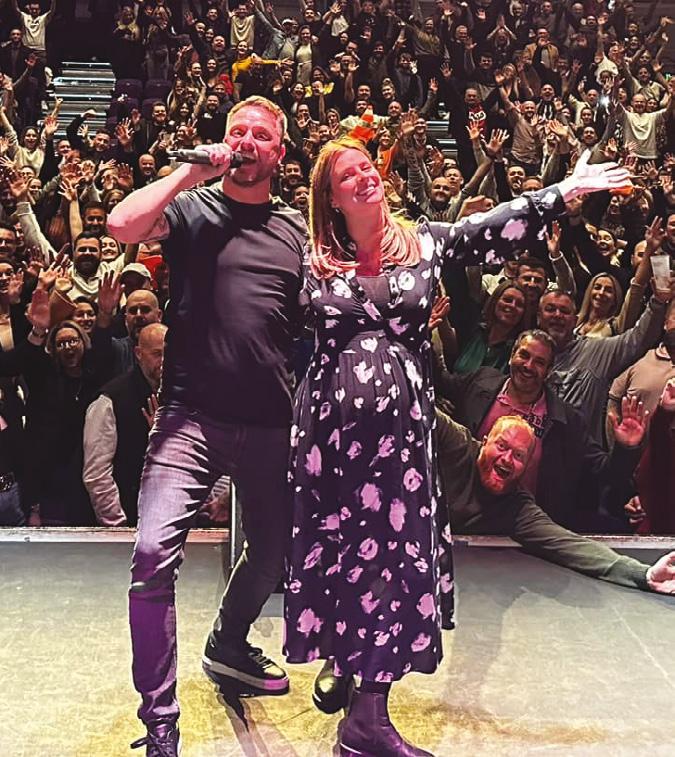
\\ THE MORE CONTROVERSIAL YOU ARE, THE MORE VIRAL IT GOES AND THE MORE MONEY YOU MAKE //
A few months later after we got married we went to Marbella for the premiere of my film, The Last Heist. She begged me to stop drinking. I agreed but the following day I went wild. She flew back home and wouldn’t let me see her or the kids. It was the wake-up call I needed and made me realise all I really wanted was my family.
That was the last time I used drugs as I then went into rehab. You take it one day at a time but I’m now more than 600 days sober.
I started a podcast, Menace to Sobriety, where every week I spoke about addiction to an expert, author, or scientist and learnt something new.
I’d been a binge drinker and drug user since I left home when I was about 15 years old so didn’t know any different. I never contemplated I had a problem because everyone around me was getting off their nut every weekend. Good week? Let’s get off our nut. Bad week? Let’s get off our nut. It wasn’t until my wife gave me that ultimatum and I tried to stop that I realised
\\ YOU TAKE IT ONE DAY AT A TIME BUT I’M NOW MORE THAN 600 DAYS SOBER //
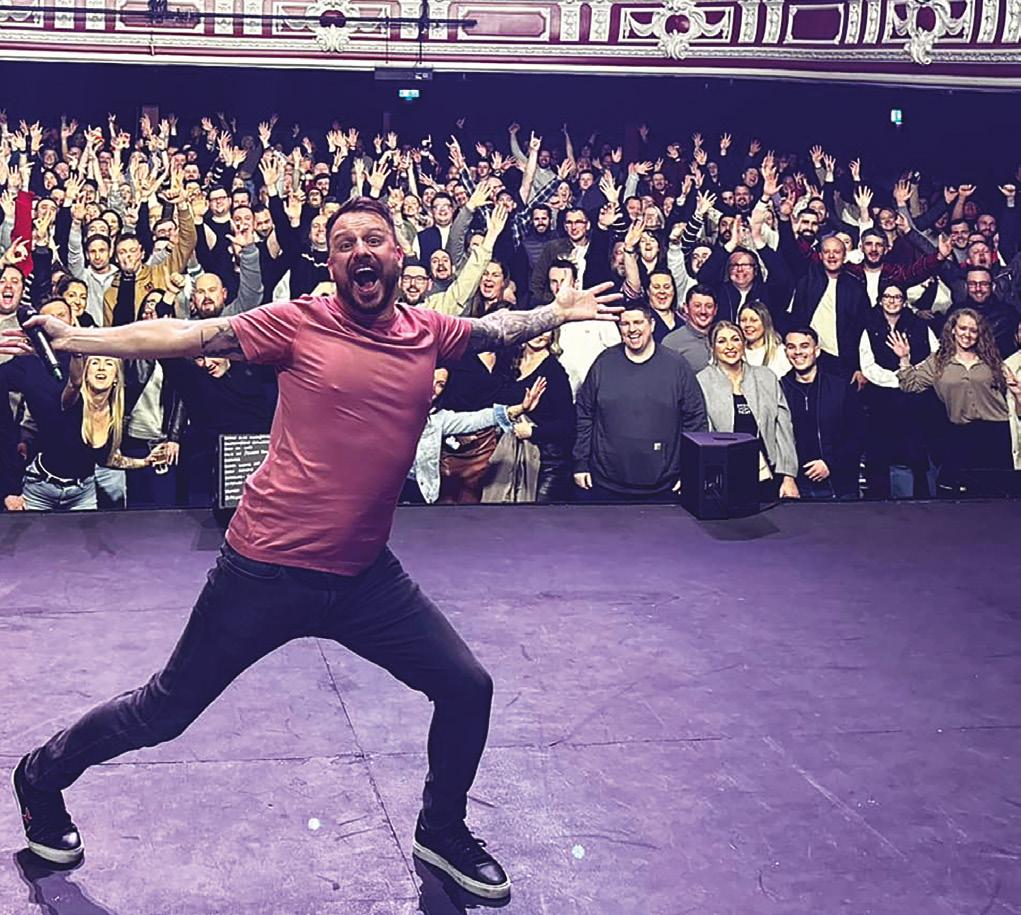
it was hard. I was public about the challenges and I think that connected with people.
The only time in my life that I’d previously stopped drinking was when I did an MMA fight with Harvey from So Solid Crew a few years ago. I saw martial arts as a way to help get sober and my early morning boxing training has really helped me get through difficult days.
Can you tell us about your focus on promoting men’s mental health?
The more I spoke about what I was going through, the more lads

reached out to me. That’s how the Facebook group M.A.T.E. (Men and their Emotions) was created. It’s now a registered charity. I just couldn’t cope with the sheer number of lads reaching out to me. They wanted to talk so my idea was for them to speak to each other because I couldn’t reply to them all. They could post about what they’re going through –anonymously if they prefer – and other lads would give their own advice from a non-condescending, non-judgmental viewpoint. It’s such a simple concept.
There’s now 46,000 lads in there, which is brilliant, but also sad because it shows how much people want it. The first thing I do each day is get on there, read messages, and reply when I can.
I’d resigned myself to never being able to tour again. Five years ago, I wanted to do a show in Edinburgh but was told by Nigel Klarfeld of Bound and Gagged Comedy that I was still too toxic. He’d made some phone calls but no one would book me. However, I was then asked on to GB News to do some newspaper reviews on the back of my sobriety podcast and Nigel was watching.
He got back in touch, told me I was hilarious on the programme, said he’d looked into the story and wanted to help give me a tour.
All he had to do was get the venues on board. Some said yes and others said no but he really fought my corner and ended up coming back with 10 dates so I signed the contract. Those initial dates turned into 25 and now it’s more than 50!
I’d previously just winged my shows as I was drinking and never able to put in the work needed. I wrote and tested material for a year before this tour began. This tour is the first time I’ve ever
worked with a comedy director, Kevin Shepherd. Kevin made me perform at comedy clubs where people didn’t know me. The jokes had to withstand actual audiences – not just my fans – before he’d allow them into the tour, so it was serious work.
I knew that the jokes would work but I didn’t know how my stage presence would be in front of all those people after so long as it had been almost 10 years. It was also the first time I was performing sober. I used to get drunk before every show – not hammered but three or four beers and a couple of tequilas. The first show back was terrifying but couldn’t have gone any better.
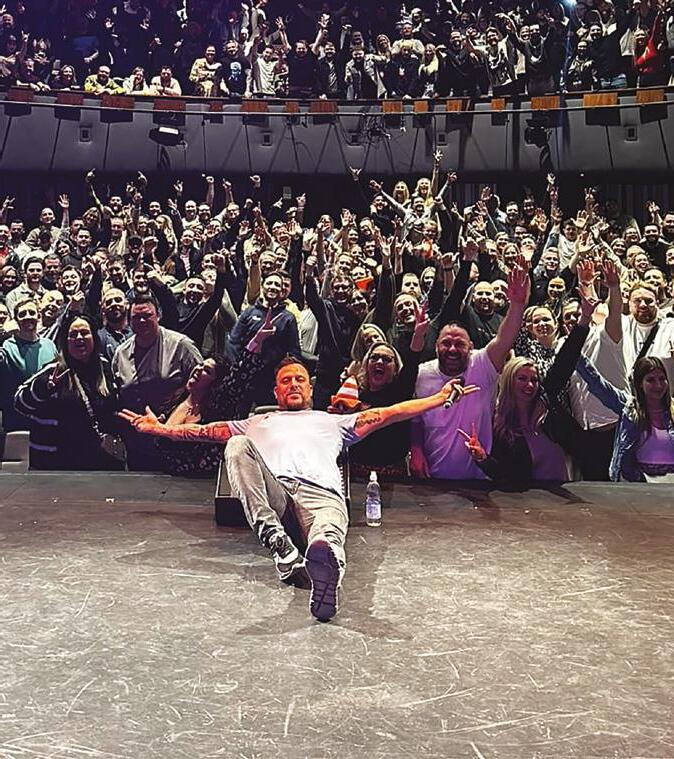
Dapper Laughs is still my Instagram handle but I think people can differentiate between my character comedy and my stuff now. But it’s a sticking point and there will always be a big stigma attached to the name.
I also believed for a long time that I was a horrible person because of all the stuff I read. I’m so insecure anyway – I think we all are – but I let all the articles and social media comments affect me. I believed a lot of the stuff that was written, but after becoming sober and meeting people at shows, I don’t think that way anymore. Yes, I was a bit of a knob 10 years ago, but I’ve grown up.
Yes, but it’s really difficult to describe. I’ve got ADHD so I get extreme mood swings anyway and I’m quite emotional as a person and very sensitive to rejection and criticism.
I’ve got abandonment issues from my childhood and have always been very fragile, with the alcohol and drugs putting me in a state of anxiety. I’ve also suffered bouts of depression throughout my life.
However, once I got over the really difficult stage of sobriety, which was more or less the first year, the colour started to come back into my life.
I don’t feel overwhelmingly happy all the time but I don’t feel sad either. I will always be up and down with my emotions but the best way to describe how I’m feeling at the moment is at peace.

What’s it like at a Daniel O’Reilly live show? I went to find out…
The Komedia in Brighton is a proper old school comedy club.
It’s small, dark and intimate. There’s nowhere for performer or audience member to hide.
Daniel O’Reilly is clearly very much at home in this environment. He’s a comic who thrives on interacting with people – especially those foolhardy enough to take a seat at the front.
He quickly homes in on a couple sitting right at the front and asks, “how long have you two been together?” The woman replies that the man sat next to her is actually her stepdad. The room erupts as O’Reilly covers his eyes in mock horror. “I can’t believe it! Two minutes in and I’ve already fucked it! I’m going
to get cancelled again!”
It sets the tone perfectly for an evening packed full of laughter. Gone are the brash ‘lad’ gags of his Dapper Laughs character and in their place is a polished set of jokes and anecdotes.
He skilfully mixes audience interaction with observations and painfully honest accounts of his addictions, successes and public failures. It’s a great show and everyone is on their feet at the end.
As we leave the venue, Daniel is working his way through a queue of people asking for autographs and photos. He looks relaxed, happy and grateful for the opportunity to be on tour again. It may have been a tough decade, but no one can deny that Dapper 2.0 is back with a vengeance.
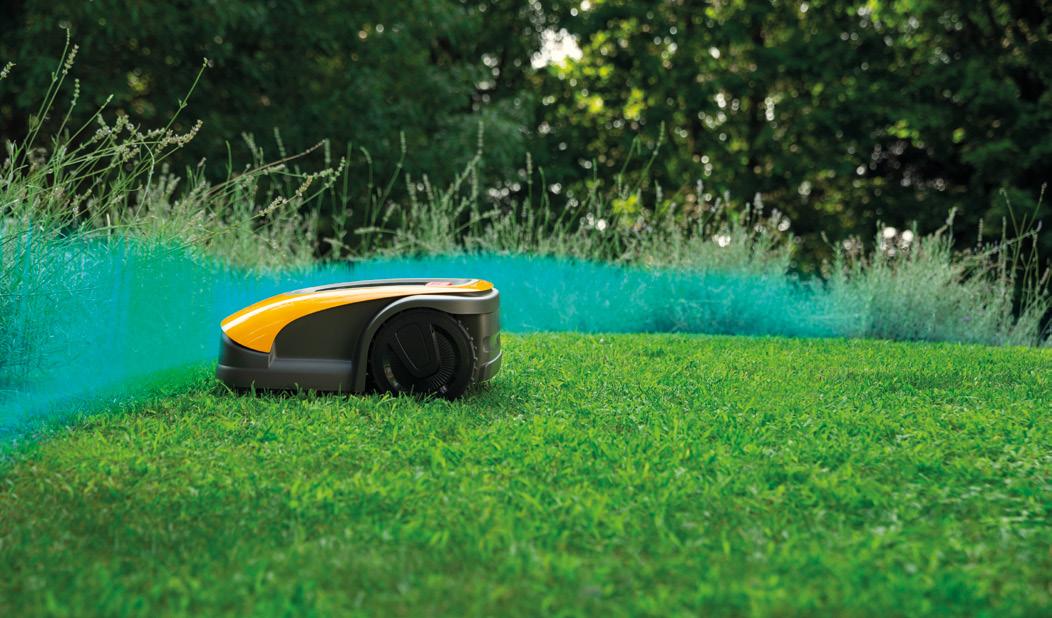
STIGA’s autonomous robot mowers, take care of the mowing, giving you more time to do the things you enjoy
Some garden tasks are really enjoyable, however, some are less rewarding and more like a chore: mowing the lawn must be high on this list. Get a better gardening life balance by using a robot mower and think of all the time you will save.
Innovative robot mowers
STIGA’s new autonomous robotic lawn mower revolutionises lawn-care with function-led design engineering that offers cutting perfection with total flexibility and control.
Intelligent mowing using AGS cloud technology
The STIGA Active Guidance System (AGS) allows the robot to intelligently plan mowing sessions ahead, knowing exactly when and where to cut, in order to never lose satellite signal strength and avoid stoppages.
Cable free
With no cable to lay in your lawn, installation is fully virtual and carried out by your local STIGA dealer. The perimeter can be changed or adapted easily after installation.
Control
You can control your STIGA autonomous robot in comfort, whether from an armchair, the office or even on holiday. From adjusting scheduling, setting a cutting pattern or changing the height of cut for instance.
Constant Communication
Using 4G network the STIGA autonomous robot communicates continuously with the reference station to ensure the exchange of data remains stable and allows it to cut with extreme precision. FREE connectivity is included for the life-time of the robot.
Quality and efficiency
The organised systematic cutting patterns are significantly more efficient and the finely chopped grass clippings are distributed down into the lawn, acting as a natural fertiliser, enhancing the health of your lawn.
STIGA autonmous robots save you time and effort while helping to keep your lawn lush and healthy.
For more information and to buy a STIGA robot mower visit your local dealer or visit www.stiga.com/uk

Intelligent garden care
Cable - free
STIGA autonomous robot mowers
New extended range for lawns up to 10,000m². Virtual installation, intelligent and efficient cutting sessions, guided by AGS technology, all managed via the Stiga.Go App
UP to £500* CASH BACK
84 men die by suicide each week in the UK. The experts at CALM (Campaign Against Living Miserably) offer their advice on what to do if someone you know tells you they’re struggling.
It can feel pretty big when someone tells you they’re having suicidal thoughts. We all want to be good mates, but when shit hits the fan, it can be hard to know what to say or do.
That’s why we’re here. Here’s our no-nonsense list of stuff to do if someone tells you they’re feeling suicidal - and as always,

you’ll find some good practical tips from people who’ve been there before. Make sure no one is in immediate danger
If someone’s life is at risk, you need to get emergency help. Make sure you are safe and contact emergency services. If that’s all okay, it’s time to chat.
What did they just say? If you’re not sure, ask
It’ll probably come as a shock if someone tells you they’re thinking of killing themselves. They might not use those words – they could say they’re ‘having dark thoughts’ or ‘things would be better off without me’.
It might not even be that obvious – weird WhatsApp messages or social media posts that don’t seem quite right. Maybe they don’t want to meet up anymore or avoid going to work or school. Trust your gut. If you’re unsure, ask. Like literally say, ‘Are you having suicidal thoughts?’

Asking someone if they’re suicidal won’t put it in their head. Take it from us. People find it a relief when someone helps them to open up and speak directly about some pretty scary feelings.
Truth is, you might not be in control of when or how someone opens up to you about suicidal thoughts or their struggles. It can happen anywhere. They might just blurt it out. Say it over dinner. In the queue at the supermarket. At the gym. While playing FIFA. The important thing is they’ve told you and trust you to listen.

If someone opens up to you, find somewhere you can chat. Somewhere you can both talk and listen. Find a space where you both feel comfortable and go from there. Don’t delay too long or put it off – it might not be an easy conversation, but it could be a life-saving one.




It takes a huge amount of guts to open up about suicidal thoughts. So, once someone has, give them time to talk about how they’re feeling and what they’re going through. Try not to cut them off or tell them how they should feel. You don’t have to have all the answers. Being there and listening is enough.
While they talk, be patient. Ask openended questions to help them share, and reassure them that things can change no matter how they feel right now.
It can be hard for someone who’s feeling really low to pinpoint why. Sometimes it’s everything, and sometimes it feels like there’s no reason at all. Try to avoid going on a why witch-hunt. Avoid focussing too heavily on the cause or solution. What matters most is
\\ ASKING SOMEONE IF THEY’RE SUICIDAL WON’T PUT IT IN THEIR HEAD.
understanding how your friend or loved one feels and showing there’s always a way forward—a reason to stay.
It can be a natural reaction to play down something scary. You might find yourself saying stuff like ‘it’s not that bad’, ‘you’ll feel better tomorrow’, or even ‘don’t be silly’.
It’s important to take someone seriously when they open up - whether it’s the first or fifteenth time they’ve spoken to you. Let them know you hear them, that you understand how much they’re struggling, and that they will get through this. Try not to minimise what they’re going through, even if it sounds small-time to you. What might seem like a small setback – a failed exam, an argument with a mate – could feel like the final straw to them, or even be a way for your mate to finally express some of the tough feelings they’ve been having.
This can be a tough one to tackle when a mate opens up. It’s natural for your head to flood with opinions and emotions. If you need it, take a second to breathe and try to clear your mind.

The most important thing is to listen and avoid judgement about right and wrong. Those conversations are for another time. In the moment, hearing how your mate is feeling and finding them the support they need is your number one priority.
Feeling speechless? Scared what you say might not help? We’ve got you covered. Here are some things to say to help you get started.
“That sounds really tough. I can understand why you’re feeling that way.”
“You know you’re not in this alone. What you’re going through is crap, but I’m here for you every step of the way.”
“I know everything feels awful right now, but things will get better. Let’s look at some places you can get some help.”
“Talking about this is a massive deal. You’ve taken the first step, things are going to get better.”
You don’t have to face it alone. Try to get other people who care about your loved one to support them. You don’t have to be specific – letting someone know their mate’s going through it can be enough. Create a support network – a group chat or a couple of people to check in regularly. It’ll help you avoid feeling overwhelmed.
And don’t forget to look after yourself. Hearing about and dealing with suicidal thoughts is hard. And it can have an impact on your mental health – so it’s important to make sure you feel supported too. Reach out to another friend or family member to share what you’re
\\ YOU DON’T HAVE TO FACE IT ALONE. TRY TO GET OTHER PEOPLE WHO CARE ABOUT YOUR LOVED ONE TO SUPPORT THEM //
going through and feeling – you don’t have to share details if you don’t want to. And if you’re really struggling because of someone else’s suicidal feelings, then CALM can help.
This is a biggie. You can’t do it alone. If someone’s having suicidal thoughts, then they need help. And there are professionals who do just that. Get them in touch with their GP, contact a mental health service, or call a helpline like ours.
NEED HELP?
CALM’s helpline and livechat are open from 5pm to midnight every day. 365 days a year.
Call – 0800 58 58 58
Webchat – thecalmzone. net/get-support



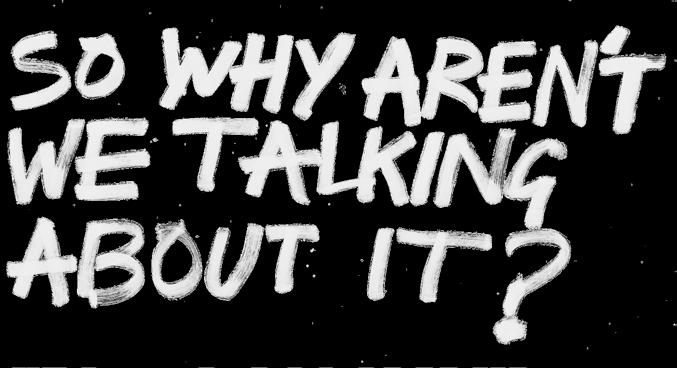

Wes Nelson isn’t your stereotypical former Love Islander. He’s got a background in nuclear engineering, he’s not a big fan of social media, and he wants to keep his relationships private. He explains the imposter syndrome he felt after becoming famous, how ADHD and panic attacks affect his day-to-day life, and how finding his one true passion has led to a Platinum record and collabs with Craig David, French Montana, and Clean Bandit.
Has music always been a passion for
I’m ADHD, so I’ve always had lots of fleeting interests, where I’d get obsessed with something for a while. First it would be football, then skating, then golf, then it’d be this and then it’d be that. But music is the one thing that’s always remained constant for me since I was tiny.
I think you’re a lucky man if you can find something that you love doing, so I feel very lucky to have found something that I love.
How does the ADHD affect you?
I quite often do 14-hour days in the studio and one of the benefits of it is that I can hyper focus. I get so into what I’m doing that I forget to eat and drink.
But there are other things I really struggle with because of the ADHD, like organisational stuff. But I’m taking my medication and that’s helped a lot.
You’ve also experienced anxiety and panic attacks?
I have them fairly often, but they’re nowhere near as bad now because I’ve had them and I understand it. The first time, I thought I was dying. I felt like I was having a heart attack.
I still get it, but I’ve started to keep my anxiety under control a bit more. I


\\ NOW,
WHEN I FEEL ANXIOUS, I ACKNOWLEDGE IT AND THAT’S THAT //
understand the symptoms and I’m aware of what it feels like to be anxious or to have a panic attack, so now I don’t think I’m dying. I think before I was trying to fight it and then you start panicking.
Now, when I feel anxious, I acknowledge it and that’s that. I used to think, ‘Why do I feel anxious? Why me?’ Sometimes you just do. I could be on a car journey, travelling home, doing nothing, and just feel anxious for no reason. It’s weird and it doesn’t make sense but I’ve accepted that that’s part of my brain. That’s cool and I’m happy with that.
\\ YOU MAKE
BASED ON HOW IT’S PEOPLE YOU DON’T GOING TO AFFECT KNOW //

Before Love Island, you were studying to be a nuclear engineer – do you think you would you have gone down that path?
Absolutely. I enjoyed it and I was good at it. I wanted to follow in my dad’s footsteps, because he was an automotive engineer. But it was never what I really wanted to do. The big dream has always been to be a music artist. I just never really had the confidence to go for that as a kid, so I slipped into the academic route.
How did you learn music?
I’d never had any formal tuition. I used to sing all the time, and my grandmother had a keyboard at her house, so I used to spend hours on that trying to figure out how to play different songs. I’ve always had that interest in music, and I guess that comes with engineering – I always want to get to the core of every thing and know how everything works.
How did Love Island come about?
I got a message on Instagram from one of the producers, asking me if I’d ever thought about going on the show. I was 19, summer was coming, I had some holidays, I thought ‘Why not?’ I just thought it’d be good fun. I couldn’t see any negatives to it.
Did you have a big Instagram following at the time?
I think I had 30k or 40k. That was mainly from when I was fighting and kickboxing and posting thirst traps like a 19-year-old with Instagram does!
Were you trying to build a following to get famous?
I think I was just interested in getting a little side hustle. I think that was around the birth of Instagram influencers and stuff like that. I thought, ‘If I can get some free clothes out of this, I’m bloody winning,’ but I never did get any free clothes! I think it was just growing naturally at the time.
Did you go into Love Island thinking it would change your life?
I’d seen that Chris & Kem and a few people from the year before had done well, but genuinely, from the bottom of my heart, me and quite a few of the guys on the show really didn’t care about that. I think one of the reasons I did alright on the show is because I didn’t have any expectations of what I wanted from it; I just went on to have a good laugh. Obviously I knew there would be some opportunities – I’m not naïve and saying I had no idea – but no one really took it that seriously, and I think that’s why people loved watching it.
When we were walking through the airport afterwards, no one really knew what was happening. Then, when we opened our phones, obviously we saw it was mental.
Do you think it’s different now, with people going on the show hoping to get famous?
Oh, hell yeah. It only really blew up the year before I was on there, so at the time there weren’t really many people to compare to. Whereas now there’s 40-odd people every year and you see them all doing this and that after the show. It’s like you go on it now to have a career. But, as every year goes by, the less chance you have of making a career from it, because there’s just so many fish in that pond.
I feel like the public opinion of islanders has completely changed. There’s a lot more stigma surrounding it now.
\\ I’D RATHER SHOW IT TO 100,000 PEOPLE AND 99,000 OF THEM HATE IT THAN ONLY BE ABLE TO PLAY IT TO 10 PEOPLE //
How much did your life change when you finished the show and how hard was that to deal with?
It was nuts! I capitalised on it with public appearances and club appearances and all that kind of stuff, but at the same time I felt a lot of imposter syndrome. I didn’t understand where all this popularity had come from because I still felt like I’m just a bloke from Stoke. I don’t think I realised at the time but I was masking a lot of discomfort. I was drinking too much to try and enjoy it because it just didn’t connect with me.
So that’s when I started to drop all the influencer stuff because it just wasn’t fulfilling me as a person.
When I came into music, it felt more natural because I had some substance to stand on and a purpose.

You starred in several reality shows after Love Island – was that part of a plan to grow your following to help with music?
It was more cool opportunities and things that I’d always wanted to do. To get to be in the SAS for a week, to swim the channel, to do Dancing on Ice –that’s cool to me.
What I didn’t expect was the confidence boost it gave me. Being in front of the camera and diving in at the deep end forces you to be confident. And that’s what gave me the confidence to take the dive into music. If I hadn’t done all those things, I don’t think I would have had the confidence to do music. I remember I used to see music classes in school and really wish I could do that. But in Stoke. if you’re not a plasterer, a plumber, or a tradesman, it’s like you’re dreaming. I knew I would have got laughed at. I wish I would have had the confidence to pursue music when I was younger, but that’s life – everything happens for a reason. If I wasn’t a nuclear engineer, they wouldn’t have been interested in me going on Love Island. If I didn’t go on Love Island, I wouldn’t have been able to do the other shows. If I didn’t do the shows, I wouldn’t have the confidence to be a music artist. Everything has a knock-on effect.
And then when you fully committed to music, how did that happen?
I was writing a lot just before I went on Celebrity X Factor. I was watching YouTube videos and learning things and really enjoying it. I still to this day don’t know why I got asked or how they found out I could sing. I was probably singing at a party and it got posted on Instagram or something stupid like that. On the show I was watching everything the producers were doing and chewing their ear off for advice. Then I’d go home and buy the same kit and try everything out. I got the love for production and got obsessed with it.
When did you take the plunge with your first record?
Right after X Factor it became COVID and there were no studios
open. But I’d learned how to record myself and I had all the kit. I recorded See Nobody in Josh Denzel’s spare bedroom with my little bits of equipment. That was it, then the labels started rolling in.
Having a following must help get people listening to your music, but does it make it harder to get people to take you seriously as an artist?
Absolutely. It took a number three chart for my first record, top 10 for my second, another top 20 for my third, for people to then go, ‘Oh, you know what? Fair play. That’s actually good.’ If that was a brand new artist, imagine the hype.
But I love the position I’m in now. One of the biggest struggles is getting your music out in front of people, so it’s a blessing that I can get my music out and people can hear it.
Do you get any negative responses to your music?
Justin Bieber gets the most hate and he’s the biggest artist in the world. The biggest artists in the world get
hate. As an art, people are going to like your stuff or not like your stuff. You’re only making it for the people that like it. The rest of them aren’t going to like it anyway. There’s no point focusing on it. I just make the music that I love to make. If you like it, you like it. If you don’t, you don’t..
I think artists are more concerned about people hearing their stuff. I’d rather show it to 100,000 people and 99,000 of them hate it than only be able to play it to 10 people. Whether you like it or not, I’m still going to be making music.
Are there any parts of being a musician that you don’t enjoy?
When you release a record, it’s like a sigh of relief, because you’ve been working on something for ages and then it’s finally out. But you can’t just release a song, you have to promote it. You have to do a bunch of TikToks and other social media. You have to think of different ideas of what’s going to be engaging, and I’m not too great with that. I used to get hounded by my manager, asking why I hadn’t posted in three months when everyone else is posting every single day.

\\ I FEEL LIKE THE PUBLIC OPINION OF ISLANDERS HAS COMPLETELY CHANGED

\\ IN STOKE, IF YOU’RE NOT A PLASTERER, A A TRADESMAN, PLUMBER, OR
YOU’RE DREAMING //
It’s because I like living in the present. I’m eating before my phone eats. I’m seeing the view before my phone sees the view. But it’s not the worst job in the world so I just need to grow up and do it.
It is difficult. Put yourself in this situation: you’re in a relationship, you’ve got a combined following of two million, so now you have to deal with two million opinions of you, plus the rest from the blog pages. Is that healthy? Is that normal? You can say it doesn’t affect you, but subconsciously it will. You will make decisions on your relationship based on how it’s going to affect people you don’t know. That’s why I’ll never have another relationship in the public eye like that.
No, you just don’t post about it [laughs]. I’m not that famous to the point where people are camping outside my house. Even if it gets out, that’s fine, but I’m just not going to be the guy that’s posting about it and making it part of my career.
Wes’ new single ‘Barcelona’ is out later this month (on Foot Down Records / Sony RCA) and he embarks on a headline tour across the UK in November.
CAN BE
But it dosen’t have to be.
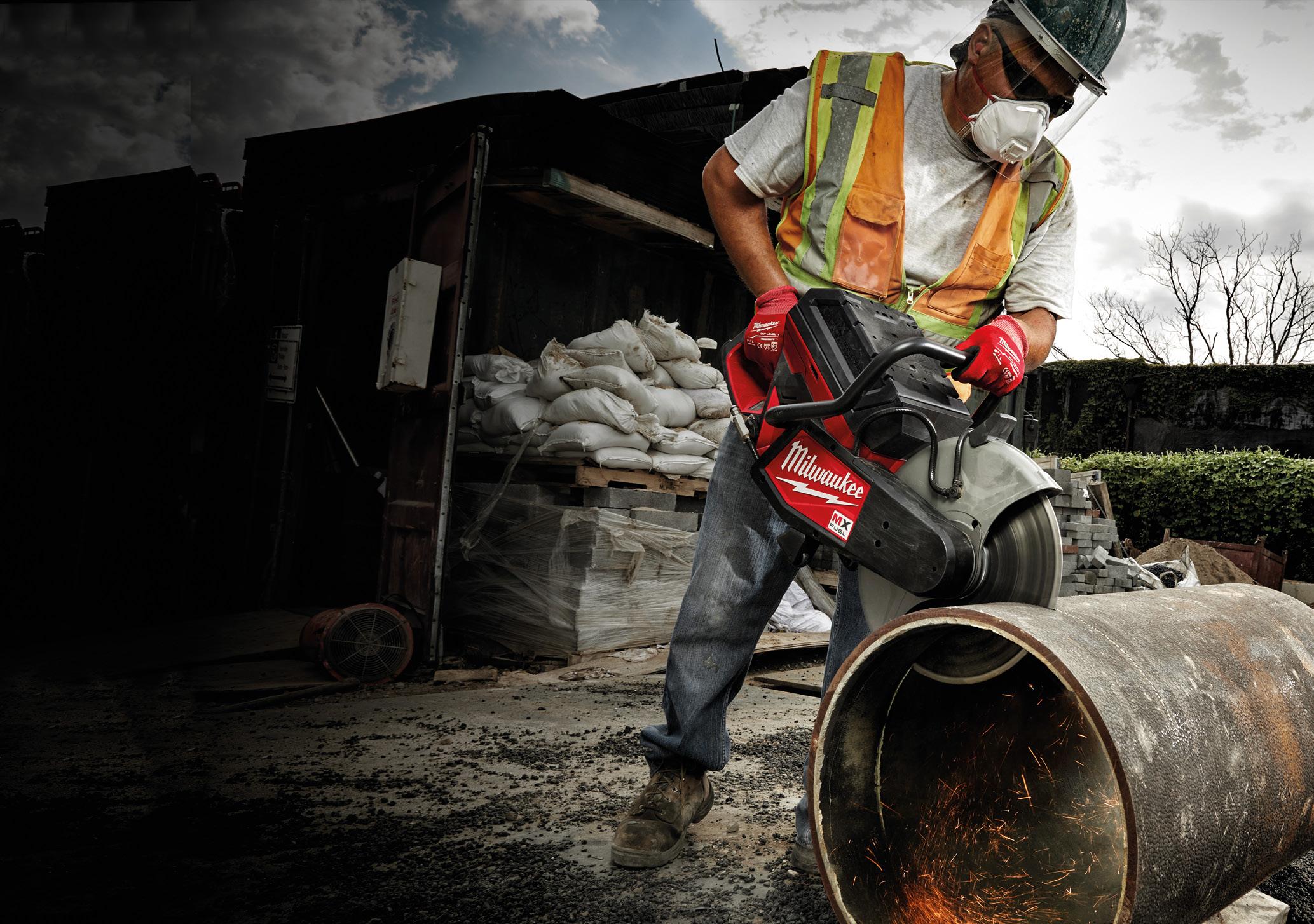
Available from our nationwide service centres, on the phone, on the app and online. With 4 hour delivery available on 350 lines. Get the job done easier with tool hire from Speedy Hire.
Proud to support















The experts at Carwow name the 10 coolest cars money can buy.



Less obvious than a BMW 5 Series Touring, more modest than a Mercedes E-Class Estate and just simply cooler than an Audi A6 Avant, the Volvo V90 wagon is achingly cool, from the timeless exterior design to the simple, elegant interior.
Okay, so the name’s a bit of a mouthful, but shooting brakes (estate cars with sloping roofs) are almost always cool, and the Arteon is a handsome example of this handsome class of car.

Sure, the well-built interior isn’t quite as aesthetically pleasing as the exterior, and the eye-catching Turmeric Yellow paint of the standard Arteon is no longer offered, but specify Kings Red metallic and the 190hp 2.0-litre petrol engine (there’s also a seriously rapid 320hp R model), and you’ll have yourself a cool, swift estate car.




There’s an argument to be made that the full-fat Range Rover should be on this list, but that’s too obvious a choice, and while the latest Rangie looks clean and cool, it’s sheer size means it’s nowhere near as sleek as the Velar.
The Velar was also the Land Rover product that ushered in the minimalist design cues that define the brand today, with its pop-out door handles and bluff front end setting the tone its big brother arguably follows. Even the name is cool, with ‘Velar’ effortlessly tripping off the tongue.


It’s easy to forget how significant a car the I-Pace was when it launched in 2018, as this was the first EV from a premium manufacturer that could meaningfully bring the fight to Tesla, significantly before rivals from the established German manufacturers arrived.
But the I-Pace is cool for reasons other than friendly industry competition, being fantastic to drive and having a decent battery range, while it looks as fresh today as it did six years ago.


Amore exciting hot hatch than the easyto-recommend but almost too-competent VW Golf GTI, the i30 N should be ordered in ‘Performance Blue’ paint, and thoroughly enjoyed.
Sure, the ride is a little firm, but this is a proper driver’s car with thrilling performance from its 2.0-litre turbocharged engine, while you can pat yourself on the back for choosing a greathandling car that’s both indulgent and has a five-year unlimitedmileage warranty.



No we haven’t made a mistake, and yes, the Duster is a quixotic choice – but it’s also a cool car, while the current secondgeneration model sorted out some of the ergonomic foibles that were present in the original car.
Affordable, practical, capable and handsomely styled, the Duster looks best in metallic bronze (which Dacia calls ‘Arizona’), and it’s the choice of an automotive connoisseur who knows a good thing when he or she sees it and couldn’t care less about presumed prestige.





Not every cool car is cool just because of how it looks, but the Formentor’s styling certainly plays a big role in its inclusion in this list.
Being a Cupra means there’s a certain rarity to this car, with others likely to wonder what the cool, bronze logo denotes, and a range of intriguing paint colours adding to the car’s subtly menacing stance. Opt for the 310hp petrol engine and you’ll have a serious performance machine, too.

The mechanically related Porsche Taycan might have a slight handling edge and a posher badge that the e-tron GT, but the Audi looks sleek and effortlessly cool, whereas the Taycan’s front lights manage to look both over-engineered and unfinished (we did say this was a subjective list).
Looks aside, the e-tron GT handles very nicely indeed, is plush and posh inside, and has more than enough power for most, with the hot RS model turning up the wick even further for those seeking electric thrills.


One of the best-handling cars of the last 20 years, not that many people will know what the A110 is, and that’s sort of the point.
Small, light, mid-engined, and a strict two-seater, the A110 is brisk, provides vast amounts of feedback, and was designed to be enjoyable to drive, above all else. Sure, you could have gone for a Porsche 718 Cayman instead, but the Alpine is cooler by a long shot.




The fastest naturallyaspirated production car you can buy at the moment comes from the lunatics at Lamborghini.
The SVJ is the ultimate version of the Lamborghini Aventador supercar and produces a whopping 770hp from its 6.5-litre V12 engine. Its 217mph top speed is actually the same as the standard Aventador S, but the lighter and gripper SVJ will get there quicker and be faster around corners.









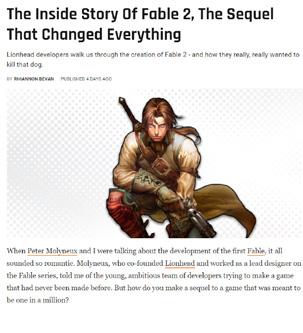
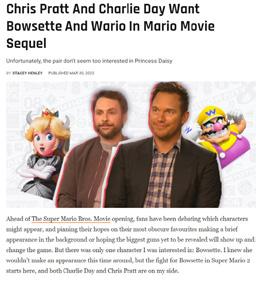
TheGamer is a gaming site with a different spin on things, and we break some of the biggest stories around. We wrote an extensive expose on workplace abuse at Techland, an oral history on Fable, and we were the first to report that PlayStation was moving to shut the Vita store down. For all your news, views, and reviews, (and guides, but that doesn’t rhyme), you should bookmark TheGamer. That’s TheGamer, no spaces.








Apple Store Rating: 4.0
Google Play Store Rating: 4.2
Price: Free
Final Fantasy VII: Ever Crisis a retelling of the original Final Fantasy 7 story, with a deeper look into Sephiroth’s past. As a mobile game, Ever Crisis also has a gacha system. Rather than summoning characters, you will summon unique weapons. For example, you may be able to get you may be able to get your hands on the Murasame, which is the most powerful sword in the game.
Apple App store rating: 4.5
Price: $7.99
Wayward Souls is a roguelike game set in a dark and grisly pixelated world. As a roguelike game, you will be able to play for short periods of time, as well as long stretches if you feel like it. Inspired by ‘90s RPGs, Wayward lets you choose between seven different classes, including Paladin, Cultist, and Spellsword. The game is also highly replayable, as the maps are randomly generated. Since Wayward Souls is paid, there are no microtransactions that you need to worry about. All content that is added to the game is free!




Apple Store Rating: 4.8
Google Play Store Rating: 4.7
Price: $8.99
Dead Cells will give your mobile device an action game for the ages. The “Metroidvania” gameplay has plenty of depth, while still maintaining the addictive accessibility that makes you want to pick it up again and again.
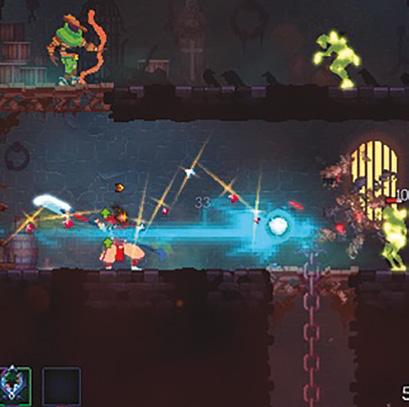
Dead Cells has players fight through a dungeon with gruelling combat, upgrading and unlocking new abilities with every death. Each new life comes with a new dungeon, and because of the game’s challenging difficulty, you’ll always want to come back for another run.
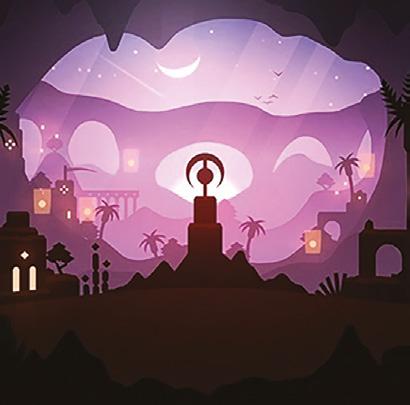

Apple App Store Rating: 4.5
Google Play Store Rating: 3.2
Price: Free
If you haven’t played Oxenfree yet in the many years that it has been out, give it a download and kick yourself later. This story-driven indie darling is atmospheric and cinematic, and not enough people have given it a try.
You play as Alex, a teen caught up in a supernatural mystery on a spooky island. The game consists of exploration and dynamic dialogue, where the player can have free-flow conversations with other characters. It’s a comingof-age story that will kill plenty of time – ideal if you have a long commute.
Apple App Store Rating: 4.4
Google Play Store Rating: 4.5
Price: $4.99 on Apple, free on Android
Dozens of games are similar to Alto’s Odyssey, but none of them are quite as compelling. This relaxing endless runner has players snowboarding down gorgeous, ambient vistas while providing enough gameplay variety for every kind of player. There are plenty of goals to work towards and mechanics that shake up the gameplay, but it also allows for totally endless playing. It’s simple, pretty, and satisfying on any level you’re willing to engage with it. If you play mobile games for simple, relaxing fun, then this one is for you.


Apple App Store Rating: 4.7
Google Play Store Rating: 4.5
Price: $3.99
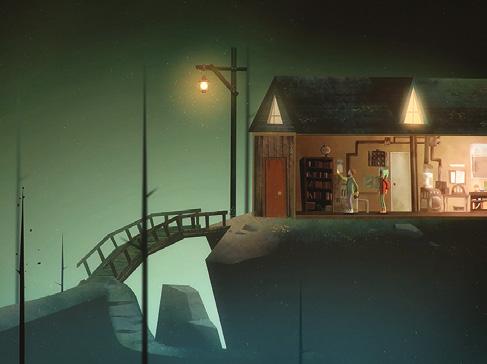


With no shortage of puzzle games on mobile storefronts, Monument Valley and its sequel are some of the most unique experiences in the genre. You must guide the protagonists from one end of the level to the other — simple in concept. However, every level is like a living M.C. Escher piece, full of optical illusions that can be difficult to navigate.
Navigating these mazes makes for a fun brain teaser, and the game’s presentation only adds to the experience. It’s all so pretty... and confusing. The series is definitely worth checking out if mobile puzzle games are starting to feel the same.

Apple App Store Rating: 4.4
Price: $4.99
Transistor is a beautiful game brought to us by Supergiant Games, who are known for their top-notch games. In Transistor, you play as Red, a once-famous singer. The story isn’t too clear at first, but as the game progresses, the world will unfold around you.
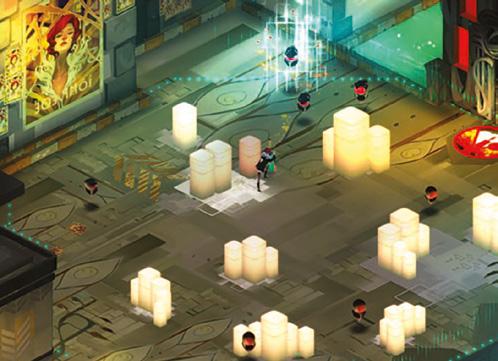
The game has smooth real-time combat, but in an interesting twist, you can also pause battle to plan your next moves. In the end, you may even be left with a tear or two.


Apple App Store Rating: 4.0
Google Play Store Rating: 4.1
Price: Free
Say what you want — Pokemon GO was an inherently great concept when it first launched, and the game has only improved since. It’s the closest thing fans of the series will ever get to an authentic mobile experience, and it encourages healthy physical activity and urban exploration.
With new Pokemon, community events, and several additional features, the game is objectively better than when it started and – despite its obnoxious popularity – is still a solid mobile game.



Apple App Store Rating: 4.6
Google Play Store Rating: 4.6
Price: Free
Of course, some of the most popular mobile games are the ones you play with the people around you. Spaceteam may be pretty old, but it is still one of the best party games on mobile devices.
Once all participants have downloaded the game, they can engage in some of the silliest cooperative experiences they will ever have. Spaceteam has players commandeer a spaceship, with each player manning ridiculously named controls. The only way to keep things running smoothly is to call out commands to the rest of your team.



Apple App Store Rating: 4.8
Google Play Store Rating: 4.3
Price: $4.99
Gris is a puzzle-platformer with the aesthetics of a hand-drawn animated film. The narrative is open to interpretation, but the gameplay follows a girl named Gris as she navigates surreal watercolor environments.
There are plenty of great platformers on mobile devices, but Gris is a standout for its stellar sound and animation. Put some headphones on, immerse yourself, and let Gris wash over you. It’s a game that will stick with you, which is increasingly hard to find on the mobile market.



Apple App Store Rating: 4.7
Google Play Store Rating: 4.3
Price: Free
If you put every looter-shooter in a blender and garnish it with Halo, Destiny, and Fortnite, then you’d get Shadowgun Legends. It might seem obnoxious at first, with text boxes and ads for premium currency flooding your screen, but it has everything shooter fans might want.
It has single-player quests, co-op, PvP, surprisingly impressive graphics, and gameplay that manages to feel satisfying on mobile. It definitely has a lifespan for players who are unwilling to shell out actual dollars for premium cash (as most of these do), but the progression system showers players in enough loot to keep them coming back anyway.


Apple App Store Rating: 4.7
Google Play Store Rating: 4.4
Price: $2.99
Plenty of city builders and “idle” games flood app stores week to week. While most of them are just vehicles for advertisements and microtransactions, Pocket City is probably the closest thing to a proper Tycoon game on mobile that won’t waste your time; it’s a micromanager’s dream come true.
You won’t have to worry about premium currency or arbitrary build times. Simply build your city, manage your economy, and create without the constant annoyances featured in similar mobile titles. It doesn’t necessarily have the depth of a PC copy of Sim City, but it feels perfectly downsized for a satisfying experience on your phone or tablet.

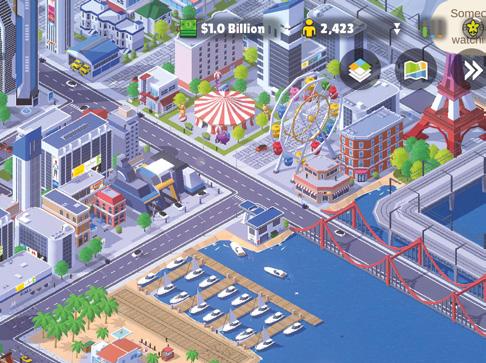


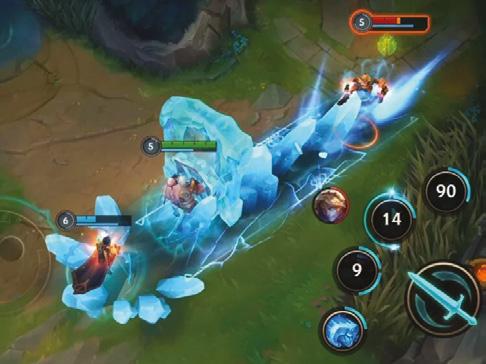

Apple App Store Rating: 3.9
Google Play Store Rating: 3.3
Price: Free
League of Legends needs no introduction. If you are a fan of the game, then you probably know about Wild Rift, which is essentially a mobile version of the game. Based on this, it would make sense that they are pretty similar.
Interestingly, Wild Rift was rebuilt from the ground up. The original League of Legends couldn’t be implemented on mobile, so Wild Rift was rebuilt. Overall, the game is still free and fun, making it a must-have for all fans of the original.

Apple App Store Rating: 4.1
Google Play Store Rating: 3.8
Price: Free
Chances are, you know what Among Us is. This game took the world by storm when it was first launched on PC, making it a great game for groups of friends. This worldwide hit is available on mobile for free.
Now you can play Among Us with friends while on the go. Thankfully, this mobile version of Among Us is also cross-platform, allowing you to play with others even if they just have it on PC.
Apple App Store Rating: 4.8
Google Play Store Rating: 4.5
Price: $4.99
At this point, Stardew Valley is practically a household name. This charming farm life simulator hit the gaming scene in 2016 and has since spread across different platforms. Now you can tend your farm and live life in the valley, right from your phone.
Developer ConcernedApe ensures that mobile players will have the same experience as those playing on other platforms. Updates are a bit behind, but this is, by no means, a ‘lite’ version of the game.

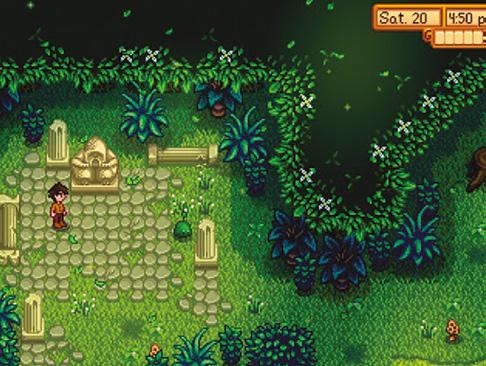
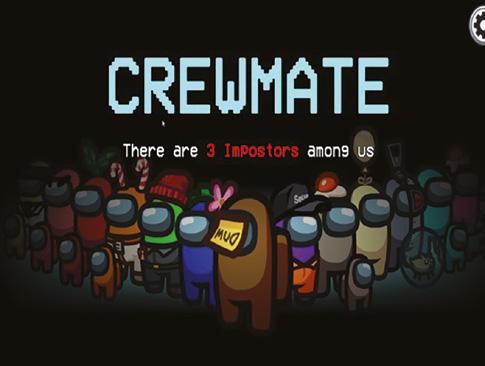

Apple App Store
Rating: 4.7
Google Play Store
Rating: 4.4
Price: Free
Marvel Snap is a unique card game that allows you to face off against other players with a hefty roster of Marvel characters. In each match, you will have six turns to place cards in three different locations. Your goal is to control the majority of the spaces, but this is easier said than done.


Many cards have abilities, such as destroying all other cards or placing rocks on every other location. Additionally, the location types change between every game, giving you endless hours of gameplay. Marvel Snap draws from the comics, so if you are an avid fan, you will recognize tonnes of characters who have yet to appear in Marvel films.
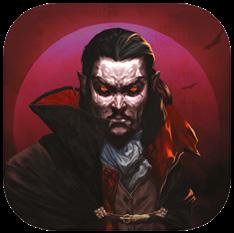
Apple App Store Rating: 4.7
Google Play Store Rating: 3.9
Price: Free
Lastly, we have Vampire Survivors. Like 20 Minutes Till Dawn, Vampire Survivors is a roguelike game, tasking you with fighting against waves of enemies on a 2D screen. The game can get pretty chaotic, especially if you have been playing for a while.
The mobile version of Vampire Survivors is the full game. Yes, you heard right; instead of paying for the game on Steam, you can download the mobile version for free.
Apple App Store Rating: 4.8
Google Play Store Rating: 4.5
Price: Free
Legends of Runeterra is a card game drawing inspiration from League of Legends. If you are familiar with other card-collecting games, this is similar to how Hearthstone is based on the World of Warcraft universe.
Legends of Runeterra has made waves in the gaming world. It’s easily accessible to many people and has stunning artwork. Although there are inapp purchases, you can play and succeed without spending any money.

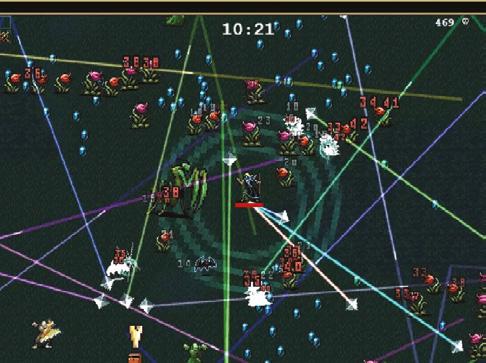
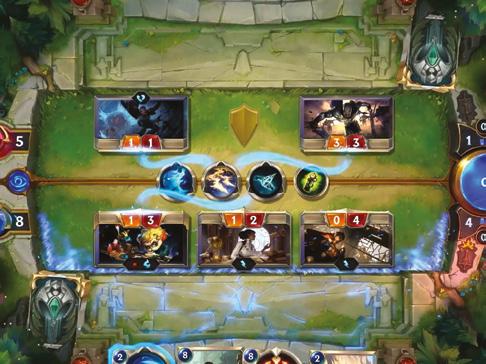
Apple App Store
Rating: 4.9
Google Play Store
Rating: 4.6
Price: Free
20 Minutes Till Dawn is a bullet-hell roguelike game, with play sessions that last around 20 minutes. In this time, you will need to slice through hordes of monsters and come out victorious. You can choose from several different characters and upgrades as well, making each run unique.
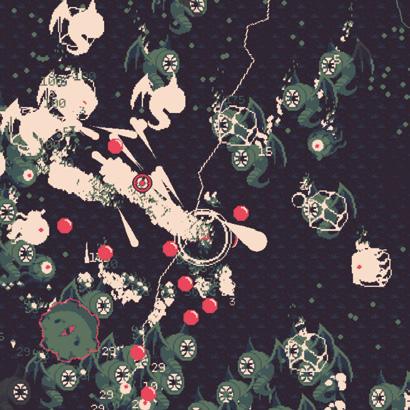


If you manage to survive for a long time, your game will become increasingly more chaotic, with enemies coming at you from every angle. There are currently two versions of 20 Minutes Till Dawn, with one being free and one costing money. Don’t worry though, the free version is still filled with content.

Apple App Store Rating: 4.3
Google Play Store Rating: 3.6
Price: Free
Genshin Impact brings us to the world of Teyvat, where you can summon various characters to fight alongside you. Unlike most mobile gacha games, Genshin Impact has an open-world feel, with a vast land for you to wander around.
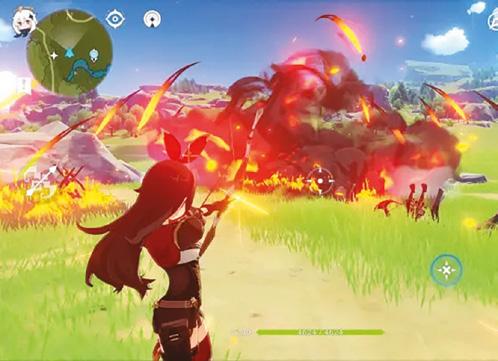
The game also features crosssaving. This means that you can play on your PC, and then open the game on your phone and your progress will remain the same. This gives you the flexibility to play from anywhere.


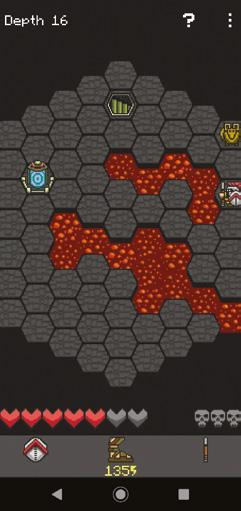

Apple App Store Rating: 4.7
Google Play Store Rating: 4.5
Price: Free
Hoplite is a turn-based strategy game that takes place on a hexagonal battleground. Rather than just charging forward, you will need to think critically as you proceed through this procedurally generated, roguelike game.
The learning curve means you will most likely die some tragic deaths before fully getting the hang of things, but you can expect some great replayability.




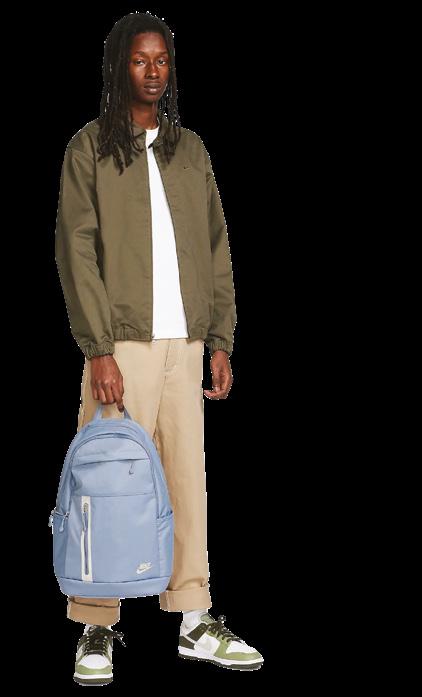







Ready to discover Europe’s best-kept skiing secrets?
Gary Clark, Academy Director at SIA Austria, shares his hidden gems in some of the most popular ski resorts on the continent.
People are trying to get away from the ‘hot spots’ and opt for the ‘hidden gems’,” says Gary Clark, Academy Director at ski instructor course provider SIA Austria. “Most of the ski resorts on our list are nestled in ancient villages that boast a long history and traditions. Your skiing trip can be much more exhilarating and enriching if you immerse yourself in the local spots and give the Alpine ski villages a chance to surprise you.”



itzbühel is a small village in Tirol, nestled in the heart of the Austrian Alps. Seamlessly fusing centuriesold traditions with modern luxury, Kitzbühel is a true gem of its own, captivating with its picturesque medieval charm. The town boasts a rich skiing legacy, enhanced by cutting-edge snowmaking and lift systems.
If you want to taste homemade Tannenwipfel Gin Spritz and authentic Tyrolean cuisine while overlooking the dreamy panorama of the Kitzbühel Alps, head to Berggasthof Hagstein. Reliving tradition in a new and exciting way for five generations, this gem welcomes its guests in a rustic setting for a truly authentic experience. Plus, it’s easily reachable by car.
For those seeking a genuine Austrian tavern experience, Huberbrau Stuberl offers a wide range of Austrian beers and traditional cuisine, such as a Tiroler Gröstl with fried potatoes and an egg or a Wiener Schnitzel. This is the perfect spot in the old town, where you will meet locals and become immersed in the culture and flavours.
Nestled in Switzerland’s expansive Four Valleys, Verbier stands as the largest and most renowned ski resort in the region. The resort’s high-Alpine landscape offers a plethora of lines and routes, making it a haven for enthusiasts seeking challenging yet accessible off-piste experiences. And the après-ski life is just as exciting as the slopes.
Tête de la Payanne ridge run is a spectacular ski trail spanning approximately 3.5km with a manageable 295m ascent and a 639m descent. The one-hour skin up from the Bruson ski area unveils the beauty that surrounds this Alpine gem. There are countless runs from the top, with the ridge run standing out as a truly spectacular experience. As you navigate the expansive trees, remember to veer skiers left, ensuring a seamless return to the Bruson chairlift via the cat track.

If you want to check out a spot that has been around for 40 years and is known both by locals and jetsetters, try Chez Dany. Located at an altitude of 1,715m, Chez Dany offers a tranquil escape from the bustling crowds, inviting you to savour a moment of paradise and traditional cuisine. Indulge in their classic fondue made from local organic cheese while relishing the effortlessly chic ambience.


For a day out in winter, The Grand St. Bernard Monastery, located on the border with Italy, is a great way to indulge in ski touring and top off your ski with a modest but delicious meal served by monks. Warming homemade soups and fresh tea served in huge mugs will make your trip.
Start your journey from the car park of the now-closed St. Bernard ski area and trace the well-defined jeep track that ascends to the Grand St. Bernard Monastery, situated on the Col Grand St. Bernard. The ascent, spanning approximately 90 minutes, unfolds amidst untamed landscapes, offering a captivating experience through nature’s stunning beauty.
Chamonix, with its towering peaks and picturesque alpine meadows, stands out as one of Europe’s most sought-after and charming mountain resorts. Renowned as the home of the continent’s highest peak, Mont Blanc, and regarded as the birthplace of mountaineering, Chamonix proudly hosts some of the world’s premier ski resorts.
The newly renovated L’Épicerie des Praz, next to the post office in the village of Les Praz, offers local products and pastries carefully selected by the owner, Gaële.




Before heading to the slopes, stop by the L’Épicerie de Praz and pick up your made-to-order sandwich prepared with fresh bread, cheese and local charcuterie produced by Gaële herself. The shop also offers an assortment of artisanal creations, such as ceramics and natural skincare products, perfect for a gift.
The classic stone Chalet Refuge de Lognan is a true gem, perched at an altitude of 2,023m on the slope of Les Grands Montets, just below the tip of the Glacier d’Argentière. It serves traditional Savoyard mountain dishes whenever the Lognan cable car is running.
Access is somewhat off-piste, which adds to the chalet’s charm.
There are two options: skiing to it from the Herse chairlift or via the Point de Vue run that follows the glacier from the Aiguille des Grands Montets cable car. Along the run from the Croix de Lognan, you will find stunning views of the village of Argentière.
The refuge is run by a local high mountain guide, the grandson of France’s famed alpinist of the 20th century Armand Charle.




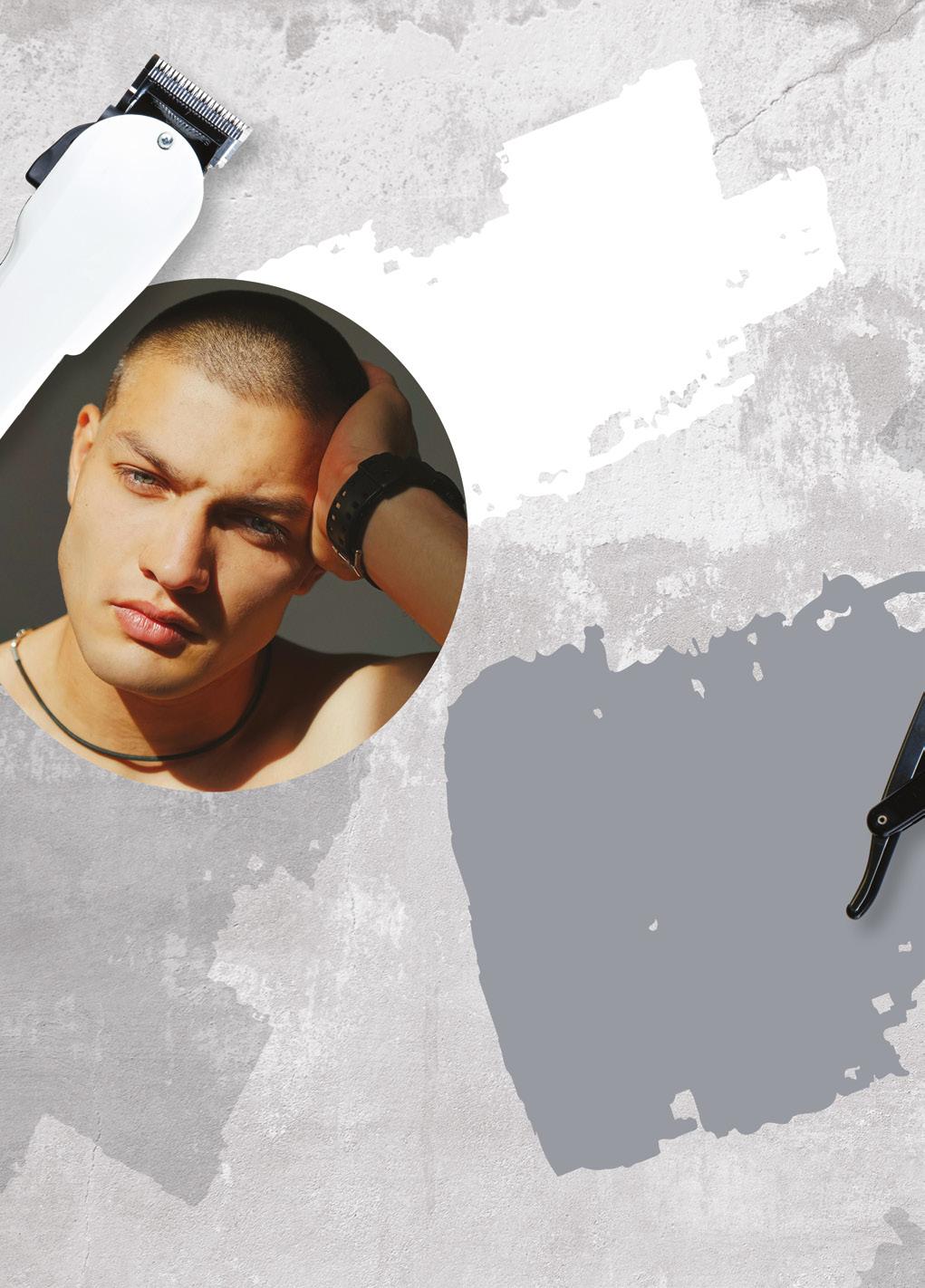
The buzz cut is a classic cut and it’s not going anywhere anytime soon! For those looking for a low maintenance style that requires no styling, this look is a perfect choice.
When opting for this look, visit your men’s hairdresser/ barber regularly for haircuts to ensure the style always looks clean and uniform.
Award-winning men’s hairdresser and director at Toni&Guy, Jim Shaw, shares the best short hairstyles to rock this summer.
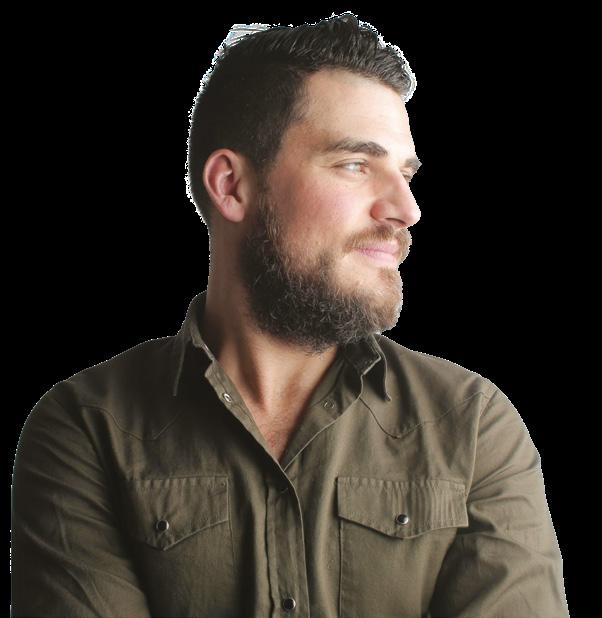
When we come into the summer, many men look to change up their hairstyle and opt for a shorter haircut that will get rid of excess weight within their hair and allow them to feel cooler in the warmer weather. These are my favourite men’s short haircuts that will be on trend through summer 2024...
The Ivy league haircut features short, tapered sides and back with slightly longer hair on top, but also involves the hair being combed to the side and back, providing the hair with a more sophisticated, polished finish.
This is another look that is great for any summer events where you want to look put together, but it can also be left more messy and edgy day-to-day for a more relaxed and casual look.
The key to this look is to ensure the side parting stands out, and therefore styling and products are essential. I like to use a fine comb and blow-dry the hair to help create the statement side parting whilst also increasing volume and then apply a pomade or wax to keep the style in place.
Combining two hairstyles in one, the taper and the fade, will be incredibly popular this summer. It looks contemporary and stylish. The hair starts as a taper at the top and then converts into a fade at the bottom.
I love to use matt products like pomades and pastes when styling this look to give it a further trendy finish, focusing on the top where the hair is longer in length and adding movement and volume.
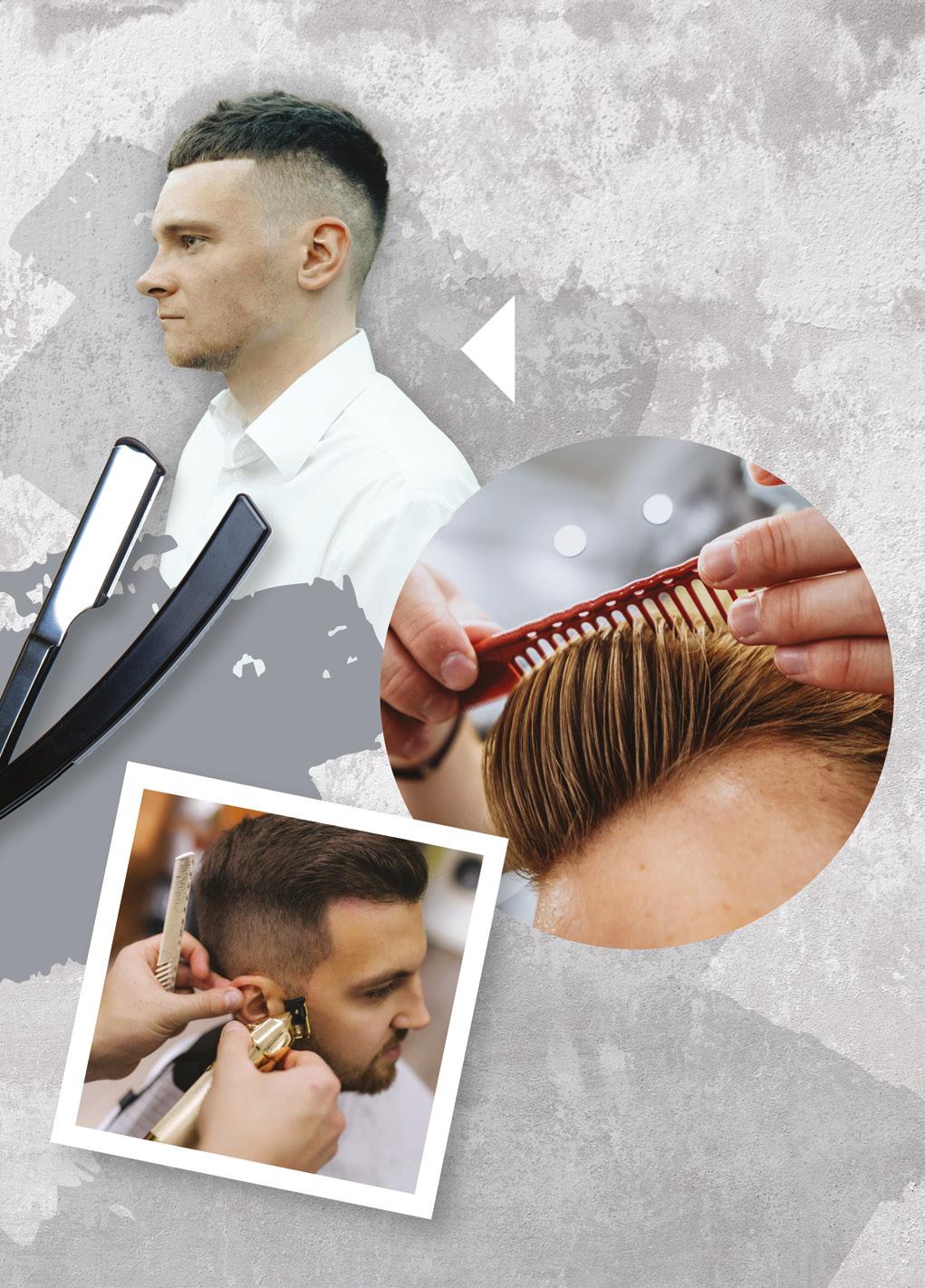
Another personal short hairstyle favourite of mine. This can be worn in many ways, but I love to pair this with a fade at the back and sides, ensuring they are cut shorter than the top and then add lots of texture into the top section of the hair for that super trendy finish. This also looks great when paired with a fringe for serious ‘cool guy’ vibes. This is also a good choice for those who may struggle with their hair thinning as the layers and choppiness within the cut help to provide the illusion of thicker hair.
Again, I like to use a matt product like a clay with this look and blow-dry this into the hair using my fingers to separate the hair and work the product through for added texture and movement.
With summer events in full swing, the comb-over is always a favoured style for men who are looking for a sophisticated hairstyle choice.
I love to pair this with a low skin fade to give the hair a statement, contrasting look, and then style with volumising products to enhance the look further.
Again, this is a great choice for those with thinning hair/bald patches, helping to disguise these areas and draw attention to your best facial features instead.



